LOANING THEIR WAY TO THE EU
PARTIALLY STATE-OWNED CHINESE BANKS ESTABLISHED A PRESENCE IN THE VISEGRÁD COUNTRIES, MAINLY TO AID BELT AND ROAD PROJECTS, WHICH STARTED FACING OBSTACLES IN RECENT YEARS.
SEE ANALISYS ON page 09
Driven by Curiosity
World-renowned Austrian-American chef and restaurateur Wolfgang Puck has recently opened, in Budapest’s Matild Palace hotel, the first European outpost of his iconic Spago restaurant, which stars as his signature culinary experience. He shares some thoughts with Diplomacy&Trade on how his career – driven by passion and curiosity – has evolved and how the experience accumulated is put to use in the Hungarian capital. see article on page 18
SPAR: 30 Years in Hungary
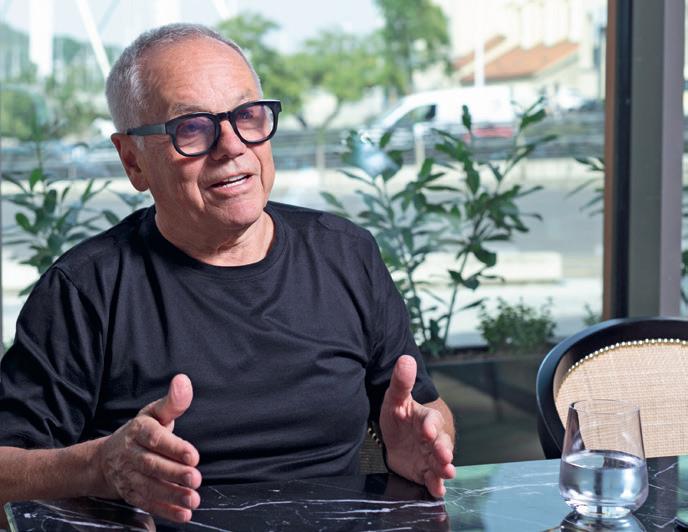

SPAR Hungary has been an important player in the Hungarian economy and retail trade for three decades. As one of the largest employers in Hungary, it provides jobs for nearly 13,000 people and supports family businesses, producers and farmers operating in this country. The company, which is celebrating its anniversary, adapts to consumer needs by keeping pace with modernization in the spirit of environmental and social sustainability.
see article on pages 10-11

JULY 2021 HUF 1710 EUR 6

YOU CAN SUBSCRIBE TO OUR NEWSLETTER BY READING THIS QR CODE WITH YOUR SMARTPHONE AND FILL IN YOUR DETAILS















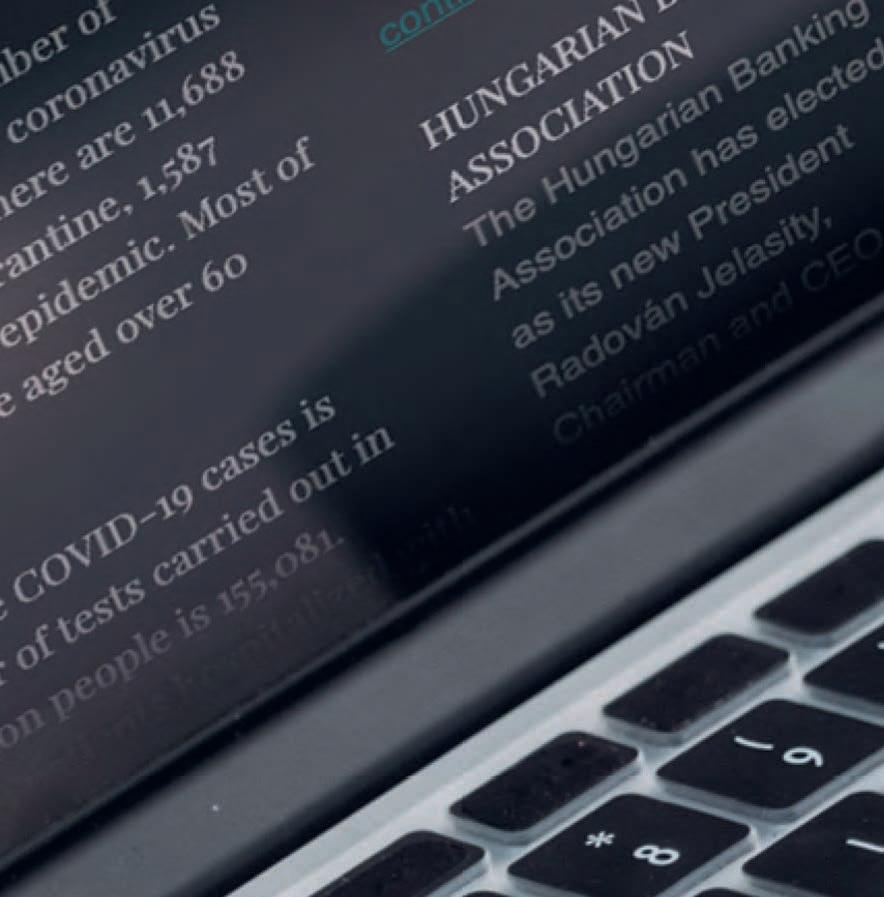

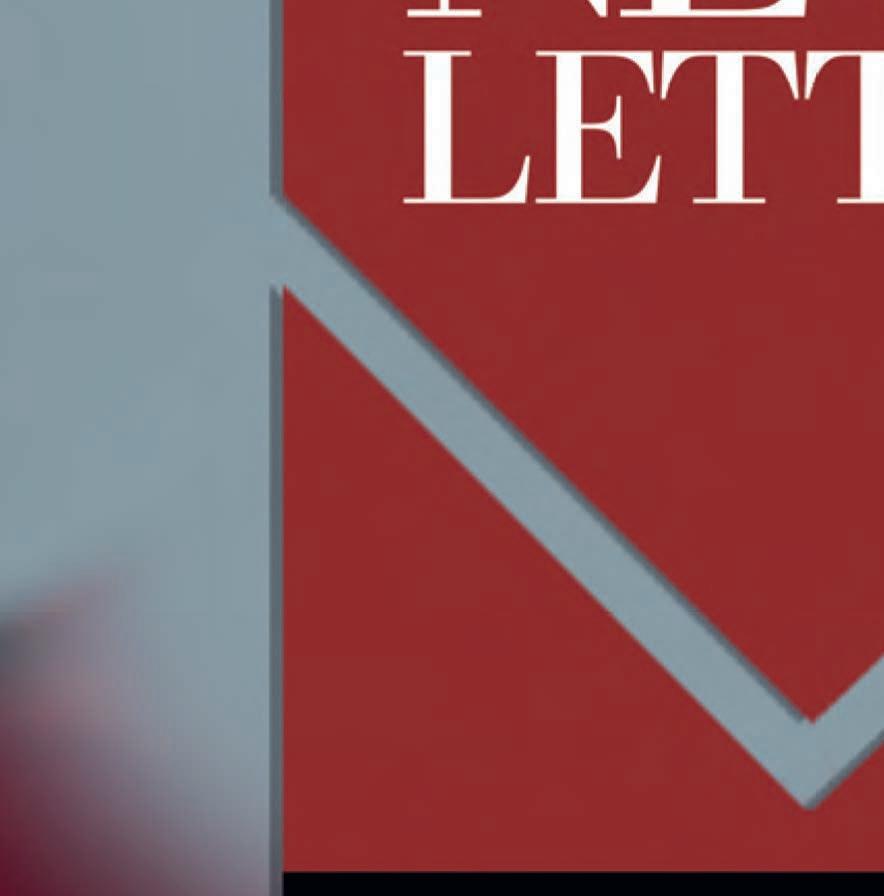


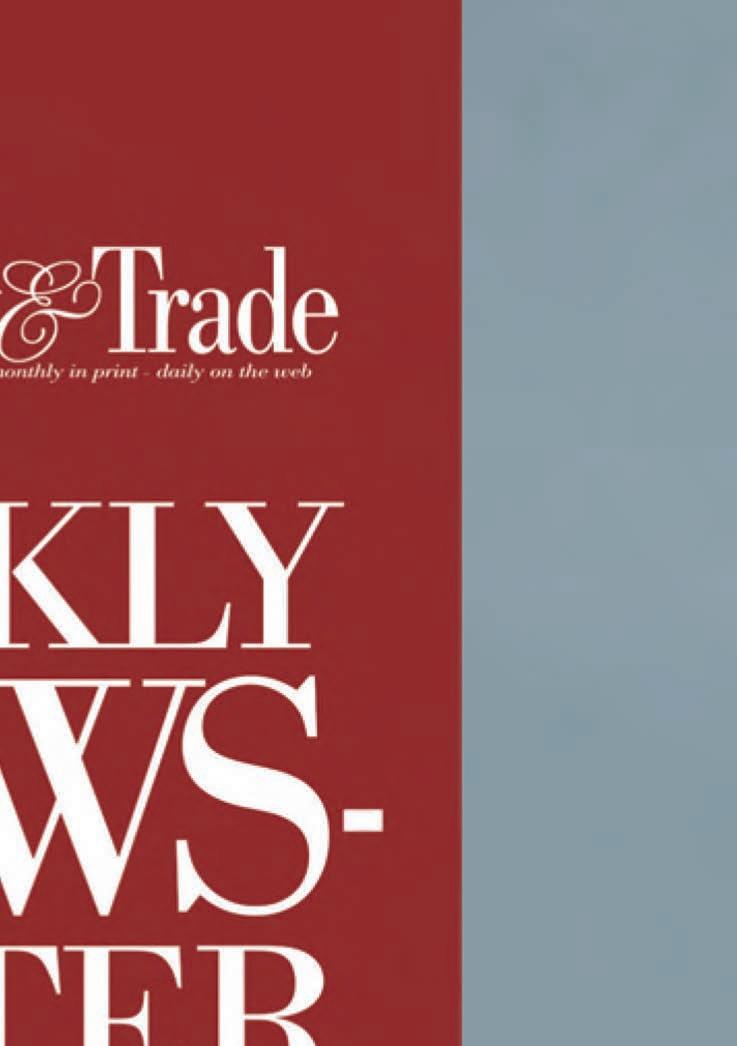
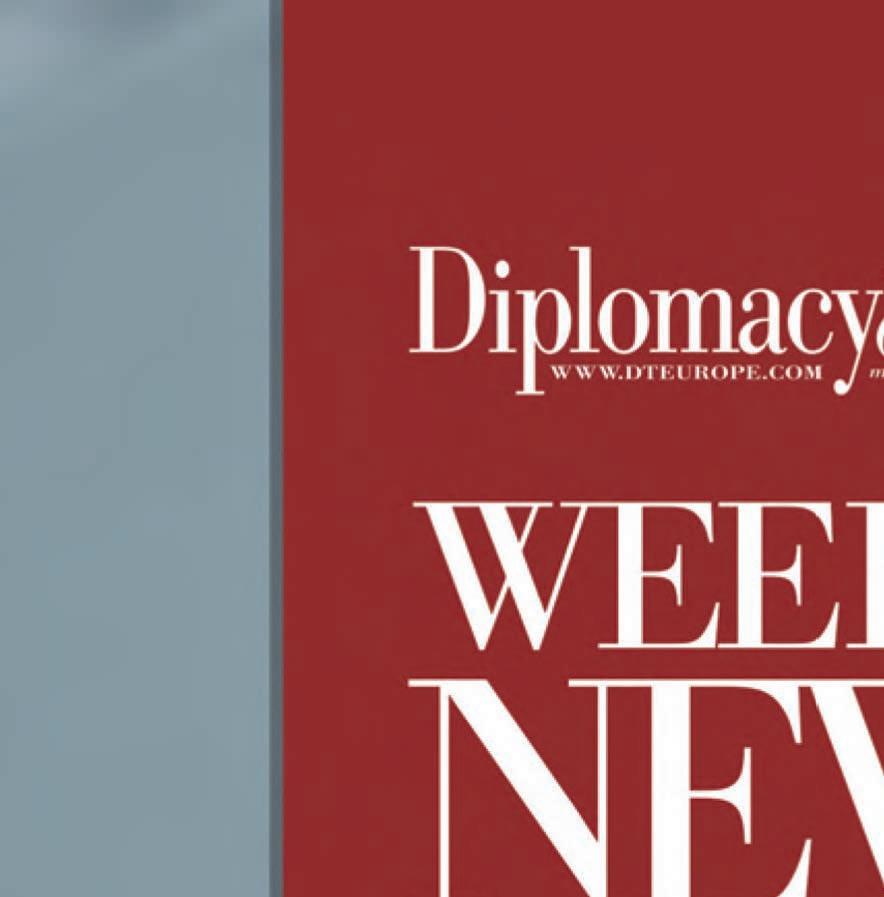

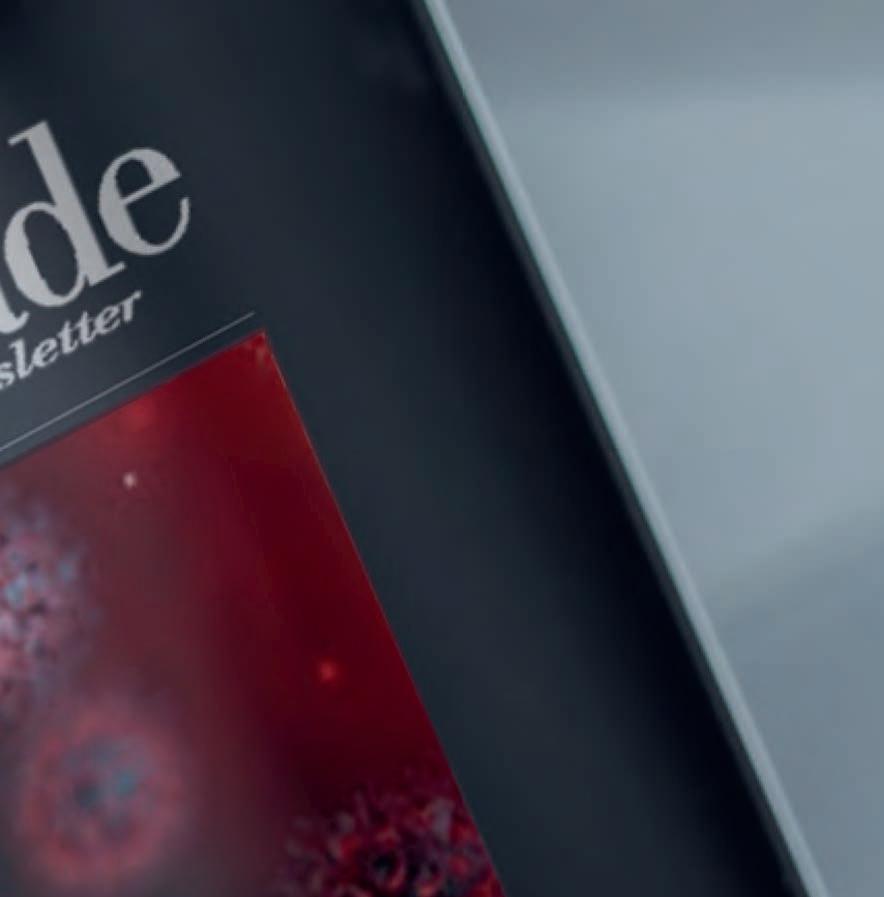
3 JANUARY 2015
letter from the publisher
In recent years, leading Chinese banks have strengthened their presence in the broader East Central European region – especially attractive for them are countries, which are members of the European Union. Many of these states are involved in the Chinese government's 'Belt and Road' policy viewed with suspicion by Western democracies. Our analysis points out the worries that all the major aspects of these 'new silk road' projects are controlled by Chinese actors. In addition, some West Balkans countries are wary of establishing too strong ties with China for the fear of risking their NATO and EU integration.
The long-standing Israeli-Palestinian conflict has again made it to the headlines recently with the fourth major armed clash was taking place between Israel and such radical Palestinian forces as Hamas and the Palestinian Islamic Jihad. The reason is historic: territorial claims between the two sides about land occupied by Israel since 1948. As our international analyst points out, the situation is complicated by aspects of internal political affairs both among the Palestinians and in Israel, not to speak of broader international interests. The conclusion, as always: no end in sight.
This month, WittyLeaks is authored by the departing Dutch ambassador who describes the intriguing historical background if his residence in District II of Budapest. The story of the occupants of the house is a bit of a mirror of Hungary’s recent history. The Kingdom of the Netherlands took over the tenancy in 2015 and since then, the building – and its garden – has witnessed vivid diplomatic life. In pre-pandemic times, “it was sometimes as crowded as a popular café.”
The hospitality section features a ‘returning guest’, internationally renowned Austrian-American chef and restaurateur Wolfgang Puck. In the April issue, we already reported on him opening a restaurant in the restored Matild Palace in Budapest. This time, he talks about his career and how that vast experience translates into his establishment in the Hungarian capital.
Our wine page highlights the story of the Vincellér Winery with wines from the shores of Lake Fertő in the Sopron wine-growing region in NW Hungary. The winery aims to cultivate grapes in a sustainable and gentle manner, in harmony with the environment.

As Hungary opens from Covid-19 restrictions, it is important to keep in mind that the pandemic is not over. Please, act wisely and stay safe as you enjoy the summer.
Peter Freed PUBLISHER
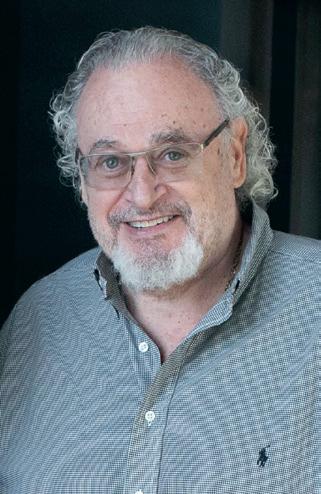
cont en ts
05 ON THE RECORD
06-07 COMPANY BRIEFS
08-09 ANALYSIS
Israeli-Palestinian conflict: another chapter; Chinese banking in the CEE region
10-11 ANNIVERSARY SPAR celebrates three decades in Hungary
12 DIPLOMACY/SPORTS
New ambassadors; Estonian Freedom Day; Római Tennis Academy welcomes back WTA tournament
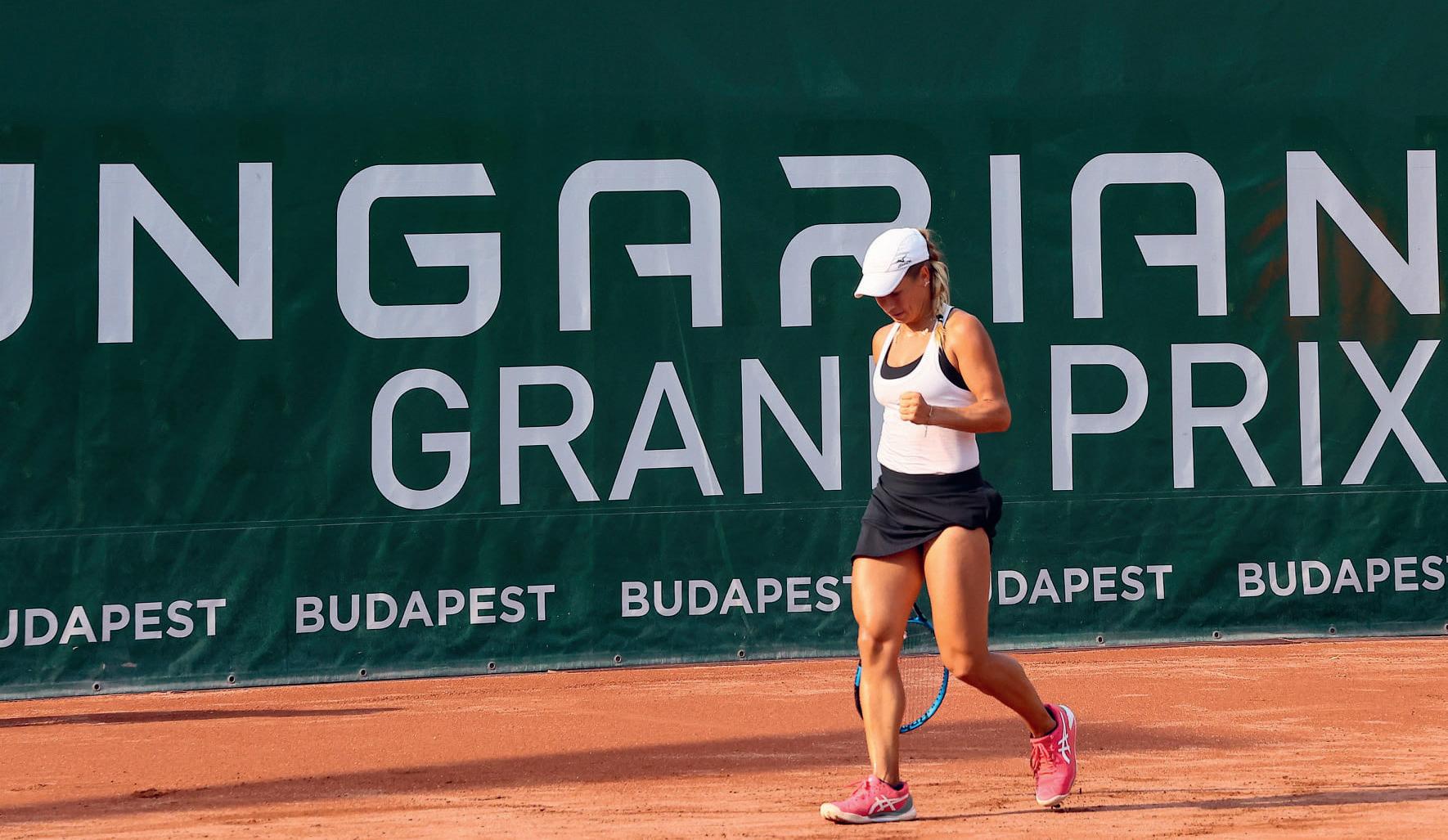
14 WITTYLEAKS by the Ambassador of the Netherlands
15 WHAT’S ON Concerts, festivals, events and exhibitions in and out of Budapest
16-17 BUSINESS
Dream Body & More; Style –Different – You
18 HOSPITALITY
Interview with Wolfgang Puck
19 WINE Vincellér Winery
PUBLISHER: Peter Freed EDITOR: Sándor Laczkó PHOTO EDITOR: Dávid Harangozó
SALES & MARKETING DIRECTOR: Tamás Varga ADMINISTRATION: Éva Madarász
CONTRIBUTORS: Sándor Laczkó, Tamás Magyarics, Zalán Zubor, René van Hell

PHOTO CONTRIBUTORS: depositphotos.com (Cover), Béla Tőke (Cover), Courtesy of Katalin Karikó, police.hu, depositphotos.com, Gedeon Richter Plc., bosch.hu, helloparks.com, Michelin, Budapest Airport/Róbert Baranyi, Zsolt Molnár, Béla Tőke, Embassy of Estonia, Johanna Víg/RTA, Róbert Hegedűs, Alberto Conti, Dan Winters, Vincellér Winery, Márton Szita, MTI Photos: Sándor Ujvári, Balázs Mohai, Csaba Krizsán, Zoltán Balogh
FRENCH FOCUS – COMING SOON

Diplomacy&Trade is going to present a special Focus section on relations between Hungary and the Republic of France on the occasion of the French-Hungarian Chamber of Commerce and Industry (CCIFH) celebrating its 30th anniversary. France is the 5th largest investor in Hungary. Just over 700 French-owned registered companies operate in the Hungarian market, employing more than 35,000 people. The leading article of the compilation will be an interview with the French ambassador to Hungary, Pascale Andréani about the main aspects of bilateral relations and also as allies within the European Union and NATO. Of course, we also present the anniversary activities of the CCIFH and several of the French ventures operating in Hungary.

JULY 2021 |DIPLOMACY & TRADE| www.dteurope.com 4 Copyright 2004-2020 DUAX Kft., all rights reserved ISSN 1589-8075 This magazine is produced by DUAX Kft. The opinions published in the magazine do not necessarily reflect the opinions of DUAX Kft. photo by MÁRTON SZITA, JOHANNA VÍG/RTA, DAN WINTERS, DEPOSITPHOTOS.COM We welcome inquires for advertising in this issue. PLEASE CALL TAMÁS VARGA FOR FURTHER INFORMATION +36 209 350 250 - tvarga@budapestweek.com AND DON’T FORGET monthly in print - daily on the web www.dteurope.com COPIES ARE AVAILABLE AT SELECTED RELAY AND INMEDIO OUTLETS IN MAJOR HUNGARIAN CITIES. NEWSSTAND PRICE: HUF 1,710 or EUR 6 - Subscriptions are available for an annual fee of EUR 72 in Hungary, or EUR 90 to all other destinations. SEND REQUESTS AND INQUIRIES TO DUAX KFT. H-1034 Budapest, Bécsi út 60. TELEPHONE [+36-70] 320-3051 FAX [+36-1] 350-5660 E-MAIL editor@dteurope.com | ADVERTISING tvarga@budapestweek.com
WTA tournament returns to Római Tennis Academy page
12
Event guide to the Hungarian capital page 15
Wines from the shores of Lake Fertő page 19
HUNGARIANGOVERNMENT EXTENDSEPIDEMICALERT PERIOD
In the middle of June, the government extended the epidemic alert by half a year, until December 18. According to the Health Act, during the period of epidemiological preparedness, the government may, among other things
- restrict or ban events that could contribute to the spread of the epidemic;
- may also restrict the operation and opening hours of shops;
- regulate the opening hours of markets and fairs in municipalities;
- may restrict or prohibit access to certain establishments (in particular outpatient clinics, inpatient clinics, public education, vocational training, higher education, social services, child protection, child welfare and public cultural institutions);
- may lay down provisions on epidemiological isolation;
- lay down rules on social distancing, such as compulsory mask-wearing or shopping lanes for more vulnerable groups;
- restrict or prohibit the movement of persons or goods within Hungary or between Hungary and another country. The alert was previously extended last December and was due to expire on June 18. During a crisis situation, the government reserves the right to make quicker decisions if the number of people infected with the coronavirus starts to rise again.
LASTHUNGARIAN SOLDIERSRETURNFROM AFGHANISTAN

After the end of the mission in Afghanistan, the last nine soldiers of the last shift arrived in Hungary, at the 59th Szentgyörgyi Dezső Air Base of the Hungarian Air Force in Kecskemét in early June. Major General Romulusz Ruszin-Szendi, commander of the Hungarian Defense Forces, receiving the Hungarian flag from the headquarters in Afghanistan, said that the flag is a symbol of the enormous effort that Hungarian soldiers have made for 18 years in the interest of common security, in partnership with NATO allies. As the soldiers landed, the Major General asked them to join the thousands of Hungarian soldiers who had successfully completed their mission and returned home to their families, and to remember together the seven comrades who gave their lives in Afghanistan for the security of the Hungarian people and the world. The commander told state media that the most important experience of the past 18 years for Hungary, NATO member states and the whole world is that "Hungarian soldiers always stand their ground, can be counted on and carry out their duties under all circumstances".
In the NATO commitment in Afghanistan, Hungarian soldiers have performed countless tasks over the past 18 years, from the light rifle squadron and helicopter training to the security and provincial reconstruction teams, the medical and mentoring team, and at the same time the operation of Kabul airport.
on the record
HUNGARIANRECIPIENT OFTHEPRINCESSOF ASTURIASAWARD
Hungarian biochemist Katalin Karikó and her fellow researchers are to receive this year's Princess of Asturias Award for Technical and Scientific Research for their achievements in developing a vaccine against the SARS-CoV-2 coronavirus, the cause of the COVID-19 pandemic.
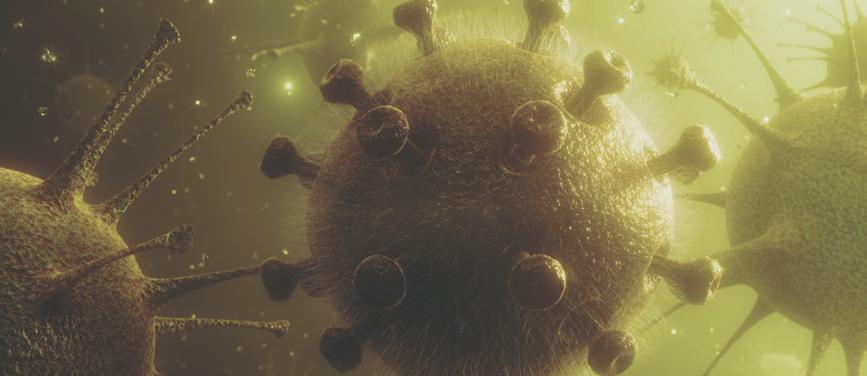
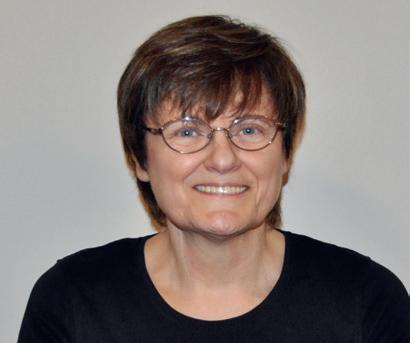
According to a statement by the Princess of Asturias Foundation, Katalin Karikó, Drew Weissman, Philip Felgner, Uğur Şahin, Özlem Türeci, Derrick Rossi and Sarah Gilbert have independently contributed to the development of some of the vaccines approved to date, all based on different strategies, but which have protein S as a common target. This protein is present on the surface of the virus and facilitates its attachment to and entry into cells. Katalin Karikó, a pioneer in the study of the therapeutic possibilities of this molecule, is considered the ‘mother’ of this type of vaccine. Together with immunologist Drew Weissman, she began working on mRNA-based vaccines and saw that this molecule caused strong inflammatory reactions because the immune system detected it as an intruder.
13 ARRESTSINHUNGARY ININTERNATIONAL POLICERAID
More than 800 people, including Hungarians, were arrested in a single day, June 8, as part of the police operation Trojan Shield in several countries around the world, thanks to a new covert messaging platform, Anom. Since the messages and pictures sent on the platform were seen by the investigators, it was not difficult to crack down on them. It was the Anom service that the criminals were using, once it became common knowledge that even the authorities were not aware of the communications going on there. But this was not true: as it turns out, Anom was actually set up and run by the Federal Bureau of Investigation (FBI).

UPCOMING NATIONAL DAYS
July 1Canada National Day
3Belarus National Day
4USA Independence Day
5Algeria Independence Day
5Venezuela Independence Day
9Argentina Independence Day
13Montenegro National Day
14France National Day
21Belgium National Day
23Egypt National Day
28Peru Independence Day
August 1Switzerland National Day
6Bolivia Independence Day
9Singapore Independence Day
14Pakistan Independence Day
15India Independence Day
17South Korea National Day
20Hungary National Day
24Ukraine Independence Day
25Uruguay Independence Day
27Moldova Independence Day
29Slovakia National Day
31Malaysia National Day
The Hungarian establishment will be owned by Hungarians who will pay a franchise fee. Most of the details are still secret, but it is known is that 50 handmade puppets will be made for the Budapest show in Acton, West London, in the only working puppet factory.
The Budapest-based organizer is Dorottya Experience Ltd, whose largest owner is József Kreinbacher, a construction entrepreneur and champagne maker and one of Hungary's richest businessmen.
The news site estimates the investment at more than HUF 10 billion, which Hungarian taxpayers will support with HUF 3.1 billion through a decision by the National Tourism Agency.
IBIKEBUDAPEST 2021
Work on Anom began in 2018, and was then introduced to underworld figures through a drug trafficker who fled to Turkey. The bait worked, as hundreds of people started using it within a short time. Altogether, Anom allowed agents to monitor 11,800 devices in 90 countries, tracking activity by as many as 300 distinct transnational crime organizations. The case also involved investigation in Hungary: according to a press release on police.hu, 13 people, also communicating with Anom, were arrested in Budapest and Szekszárd. During the search of the 13 people's residences and addresses (25 locations in total), investigators found 57 kilograms of marijuana, about 3.5 kilograms of cocaine, 3.5 kilograms of amphetamines, ecstasy tablets, crystalline drug paraphernalia, fentanyl and 13 kilograms of caffeine used as cutting agent. During the enforcement operations, cash in excess of HUF 140 million, cryptocurrency worth HUF 8.5 million and seven cars were seized.
MADAMETUSSAUDS TOOPENINBUDAPEST
In the first quarter of 2022, the world's first fully franchised Madame Tussauds will open in Dorottya Street in downtown Budapest, the news site telex.hu reported. The most unique feature of the house in Budapest is that it will be the world's first Madame Tussauds franchise location. Until now, all of these panopticums (22 in total) have been, or are currently, owned by the rights holder, Merlin Entertainments of the UK.

Around 15,000 people took part in the I Bike Budapest cycling parade, which was held again on June 26, after a year and a half of forced suspension, the organizing Hungarian Cyclists' Club told the state news agency MTI. The number of participants was based on estimates by the Club and police.
The Hungarian Cyclists' Club is sending a message to decision-makers that it is worth continuing to develop cycling-friendly facilities because there is a great demand for cycling and in the long term, it is one of the cheapest ways of creating loveable cities, the club said in a statement.

The event started at the Margaret Bridge, the march proceeded along the embankment in Buda, then crossed the Petőfi Bridge and reached the lower embankment in Pest, on to Andrássy Avenue and the City Park where the traditional bike lift ended the event.
The parade was opened by the Ambassador of the Netherlands, René van Hell, who has long been supporting the Hungarian cycling movement. According to a representative survey by the Hungarian Cyclists' Club, the majority of Hungarians would prefer to cycle in everyday life if more cycle lanes and cycle paths were built to support this.
www.dteurope.com |DIPLOMACY & TRADE| JULY 2021 5 photo by DEPOSITPHOTOS.COM, SÁNDOR UJVÁRI/MTI,
COURTESY OF KATALIN KARIKÓ, POLICE.HU, BALÁZS MOHAI/MTI
company briefs
ROBERT BOSCH TRAINING CENTER WITH EU SUPPORT
Robert Bosch Energy and Body Systems Ltd. in Miskolc has established and operates a corporate adult education center with HUF 170.28 million non-refundable EU funding from the Széchenyi 2020 program. According to information provided by the company, as a result of the two-year program, the company has started its adult education activities, and in 2019 and 2020 it obtained the necessary adult education license for 14 training programs.
In addition to the licensed training courses under the Adult Education Act, internal courses and purchased training courses have been added. Thanks to the application, training for 1,296 people has been provided," the announcement said.
RICHTER EXPANDS COOPERATION TO JAPAN AND TAIWAN
The Hungarian pharma firm Gedeon Richter Plc. has announced that it extended its existing licensing agreement with AbbVie, originally dated 2004, for the development and commercialization of its own-developed molecule, Cariprazine. The initial agreement covered the territories of the USA and Canada and was extended in 2019 to include certain countries in Latin America. The present agreement further expands the geographic scope of the co-operation to include Japan and Taiwan. Under the terms of the agreement, AbbVie is responsible for development and commercialization of Cariprazine for certain neuropsychiatry indications in Japan. Richter is eligible to receive a regulatory related milestone payment, which would be due to Richter upon the approval of marketing authorization in Japan, along with subsequent tiered royalties combined with sales related milestone payments.
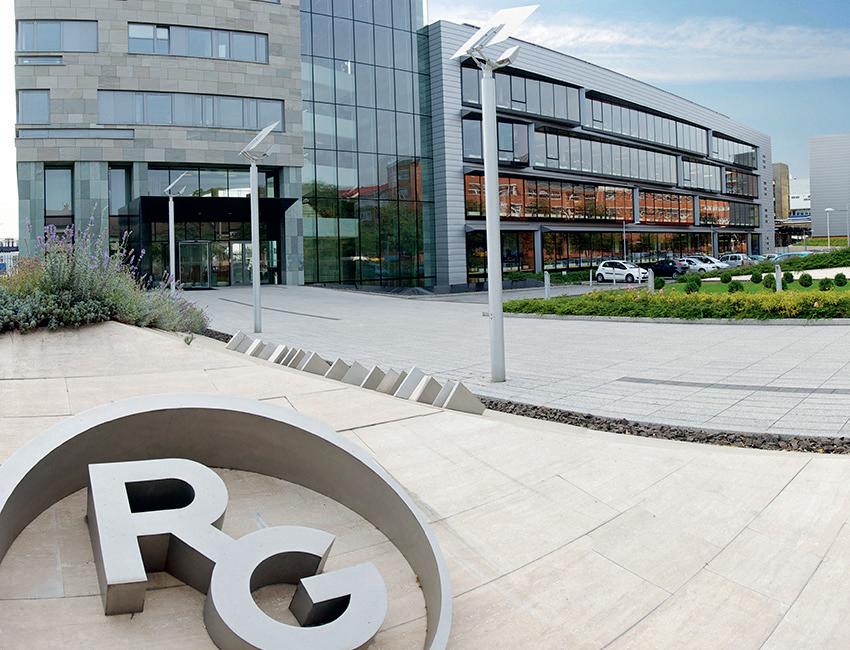
Cariprazine is an orally active and potent dopamine D3/D2 receptor partial agonist with preferential binding to D3 receptors and partial agonist at serotonin 5-HT1A receptors. Cariprazine was discovered by Richter, having been developed for the treatment of schizophrenia and bipolar mania jointly by AbbVie / Allergan (earlier Forest / Actavis) and Richter and was approved by FDA in both indications in 2015. The product is marketed in the USA by AbbVie under the name Vraylar®. In 2019, FDA approved a supplemental New Drug Application (sNDA) for Vraylar® for expanded use to treat depressive episodes associated with bipolar I disorder (bipolar depression) in adults. Vraylar® is currently under development by AbbVie / Richter in the USA as an adjunctive treatment to antidepressant therapy in adults with major depressive disorder (MDD) who failed to adequately respond to antidepressant monotherapy.
Cariprazine is also marketed across the EU, other European and CIS countries, certain MENA countries, Singapore, Thailand, Malaysia and Israel under the name Reagila® by Richter or its license partners.
CONTINENTAL
German tire maker Continental is to expand its field of software development, including the research and development activities of advanced driver assistance systems in Hungary. As part of the development to be implemented from more than EUR 11 million in Budapest and Veszprém, W Hungary, the company will create nearly 70 new jobs in high value-added R&D areas. Continental's research and development activities in Hungary are constantly growing, currently the number of people involved in R&D related jobs is more than a thousand. With this new area of strategic importance, the Budapest office will establish a closer relationship with players of the international value chain developing automated driving at Continental, taking responsibility for connecting the components that implement vehicle detection
Robert Bosch Energy and Body Systems Ltd. was founded in the summer of 2003 and manufactures automotive components and electric drives. In addition to production activities, the factory also carries out research and development and other high added value activities. In addition to automotive components, a major product of the factory is the eBike drivetrain, a motor unit using an intelligent power assistance system.
In 2020, the company had a turnover of HUF 354.6 billion, invested
HUF 8.8 billion and spent almost HUF 2 billion on research and development. The Bosch automotive company in Miskolc employs 2,700 people.
In Hungary, the Bosch Group is one of the country's largest foreign industrial employers, employing more than 15,500 people in close strategic cooperation between nine independent companies.
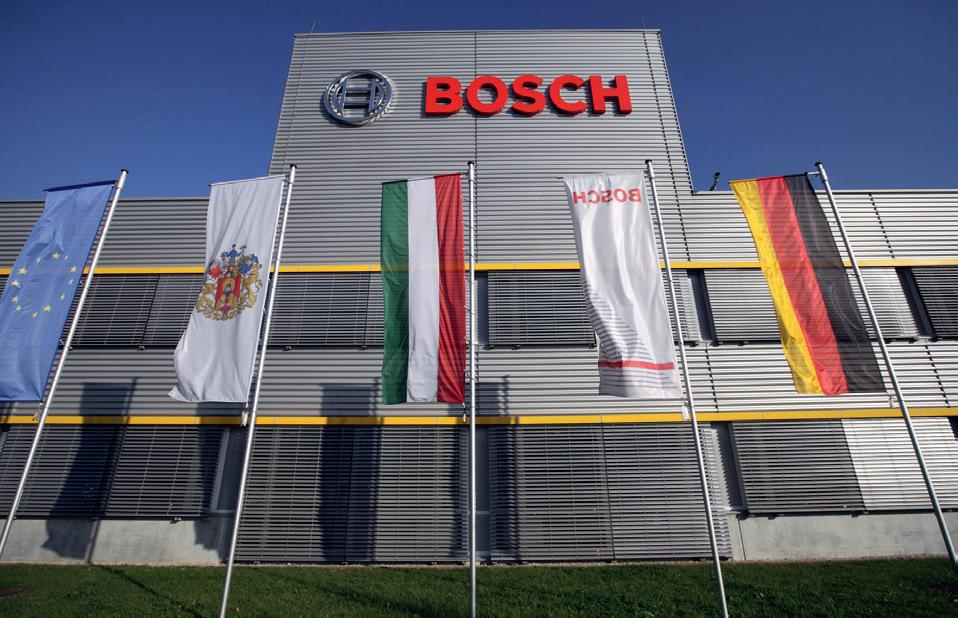
LOGISTICS MEGAPARK TO BE DEVELOPED BY HELLOPARKS
which is expected to be completed by the third quarter of 2022. The investment is worth more than EUR 50 million.
The company's development in Páty will complement HelloParks Fót in the northeast of the capital's agglomeration and HelloParks Maglód in the east, near the airport, bringing the total leasable area of the planned developments in the Budapest area to 900,000 square meters. HelloParks is building its industrial and logistics center on a 76-hectare site in Fót and has started a similar development on a 46-hectare site in Maglód. In Fót and Maglód, it has the potential to develop 330,000 square meters and 193,000 square meters, respectively of warehouse and industrial space. In response to MTI's enquiries, the company said that the first phase of the investment will be worth EUR 40 million in Maglód and around EUR 50 million in Fót, and will be completed by the end of 2021 in both locations.
HelloParks, an industrial real estate development company belonging to the Futureal Group, is developing a 400,000 square-meter logistics mega park in several phases in Páty, west of Budapest, near the M1 motorway, Futureal told the state news agency MTI this June.

According to the information, 400,000 square meters of gross leasable area of warehouse and manufacturing space will be built in several phases on a 100-hectare site in Páty.
The first phase, for which preparation has already begun, will see the construction of a 55,000 square-meter warehouse building,
Rudolf Nemes, CEO of HelloParks, said in the statement that HelloParks has reached another milestone by starting its investments in the western agglomeration of Budapest. Futureal is one of the biggest real estate development and investment groups in the Central and Eastern European region, and is one of the ten largest real estate developers in Europe. Since its creation, the Futureal Group has added more than 180 real estate development projects with a total gross floor area of 3 million square meters and a value of more than EUR five billion to its portfolio.
modelling, which implements a higher level of abstraction of the environmental perception required for driver assistance systems and thus fits in perfectly with the Centre's existing competencies.
and control. Since its establishment, the most important competence of the site in Budapest has been the creation of neuronal network-based software solutions. The essence of this is that the recognition of certain objects in the environment is performed by artificial intelligence-based solutions.
The Continental Artificial Intelligence Development Center in Budapest has been an active player in the formation of an AI based ecosystem in Hungary for a long time, is a member of the AI Coalition and
has also established close connections with the Hungarian higher education institutions, including the Budapest University of Technology and Economics, inter alia which it signed a cooperation agreement with.
Thanks to the successful work of recent years in Hungary, additional areas of responsibility will be established in the Budapest center. Through the development, the Hungarian unit expands with the field of vehicle condition and environment
The Vehicle Dynamics Development Center being fully responsible for the ESC (Electronic Stability Control) systems' project is located at Continental's Veszprém unit, which manufactures various sensors for automotive safety systems for all car manufacturers around the world. The company's production capacity is constantly expanding, and its research and development activities are also developing. This includes the coordination of other locations, thanks to which Continental is able to serve some of its customers in all parts of the world entirely from Veszprém. In addition, its sensor development department is a global competency center for a number of sensor systems.
The new project will include the development of new sensors and functions at Continental, which form the basis for automated driving and highly automated driving, but the development of other electric vehicle systems will also play a role.
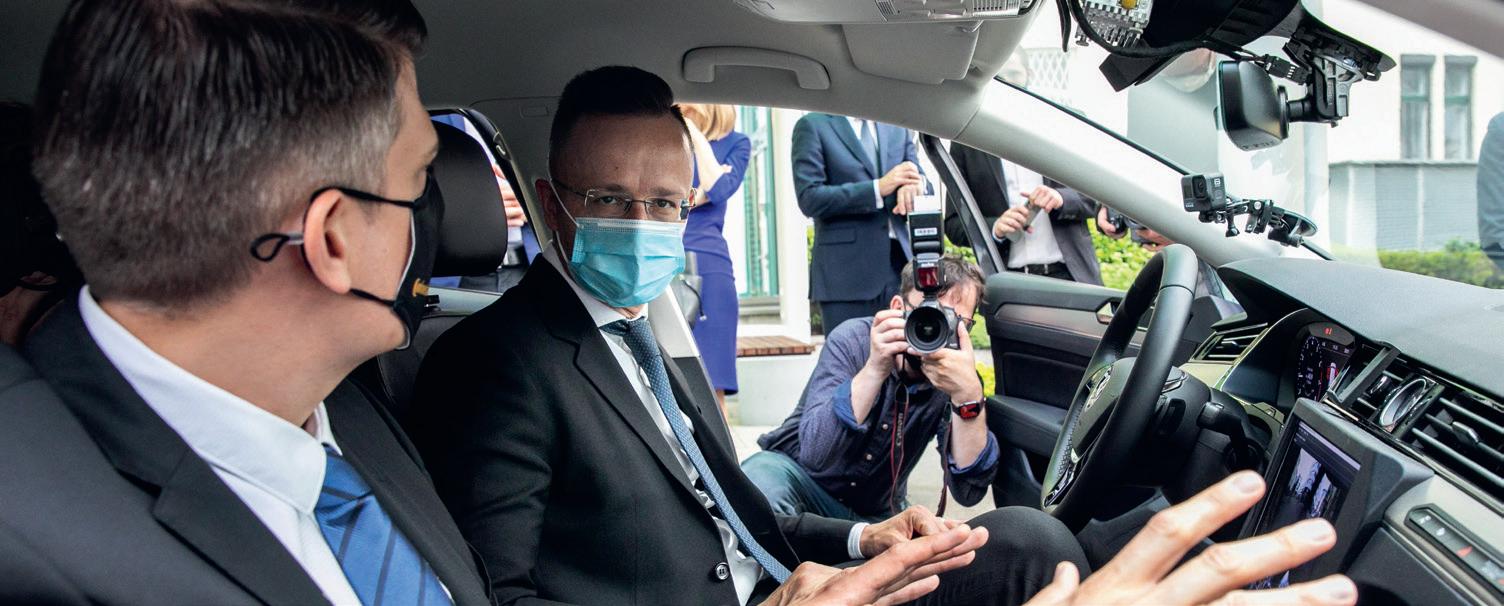
6
INCREASING THE ROLE OF HUNGARIAN R&D TEAM
photo by GEDEON RICHTER PLC., BOSCH.HU, HELLOPARKS.COM, BALÁZS MOHAI/MTI
JULY 2021 |DIPLOMACY & TRADE| www.dteurope.com
company briefs
CAPACITY EXPANSION BY CLOUD NETWORK TECHNOLOGY


















As a member of the Foxconn Group, Cloud Network Technology launches a warehouse capacity expansion investment of more than EUR 15 million in Komárom, NW Hungary. About 20% of the investment cost is covered by Hungarian taxpayers.
The establishment of a new 17,000-square-meter storage capacity supports the production of high-tech data centers and network communication devices. The development will create 30 new jobs.

The multinational company Foxconn is one of the world's most important electronic manufacturing companies, primarily engaged in the development of electric vehicles, digital health and robotics, and is also present in the market for artificial intelligence (AI), semiconductors and next-generation communication technology.
They place great emphasis on research and development and own over 83,500 patents. The group's clientele includes companies such as HP, Dell, Apple, IBM, Sony, Nintendo, Cisco, Nokia, Motorola, Siemens, Sony Ericsson or Microsoft.



Foxconn has been present in Hungary for almost two decades, and production has been continuous at the Komárom plant ever since. During this period, excellent cooperation was developed with higher education institutions in Hungary, resulting in numerous technological innovations. There is no shortage of innovative solutions: after six months of testing, the country's first live industrial private 5G network operates in the Komárom factory, by which the load test of server towers and PCs is carried out wirelessly before delivery.
In addition to the development of 5G infrastructure, Foxconn is also considered to be a pioneer in Hungary in other innovative solutions, since the industrial use of the HoloLens and its integration into the 5G environment are also tested at a number of points in both the test hall and the assembly plant.
25 YEARS OF MICHELIN IN HUNGARY
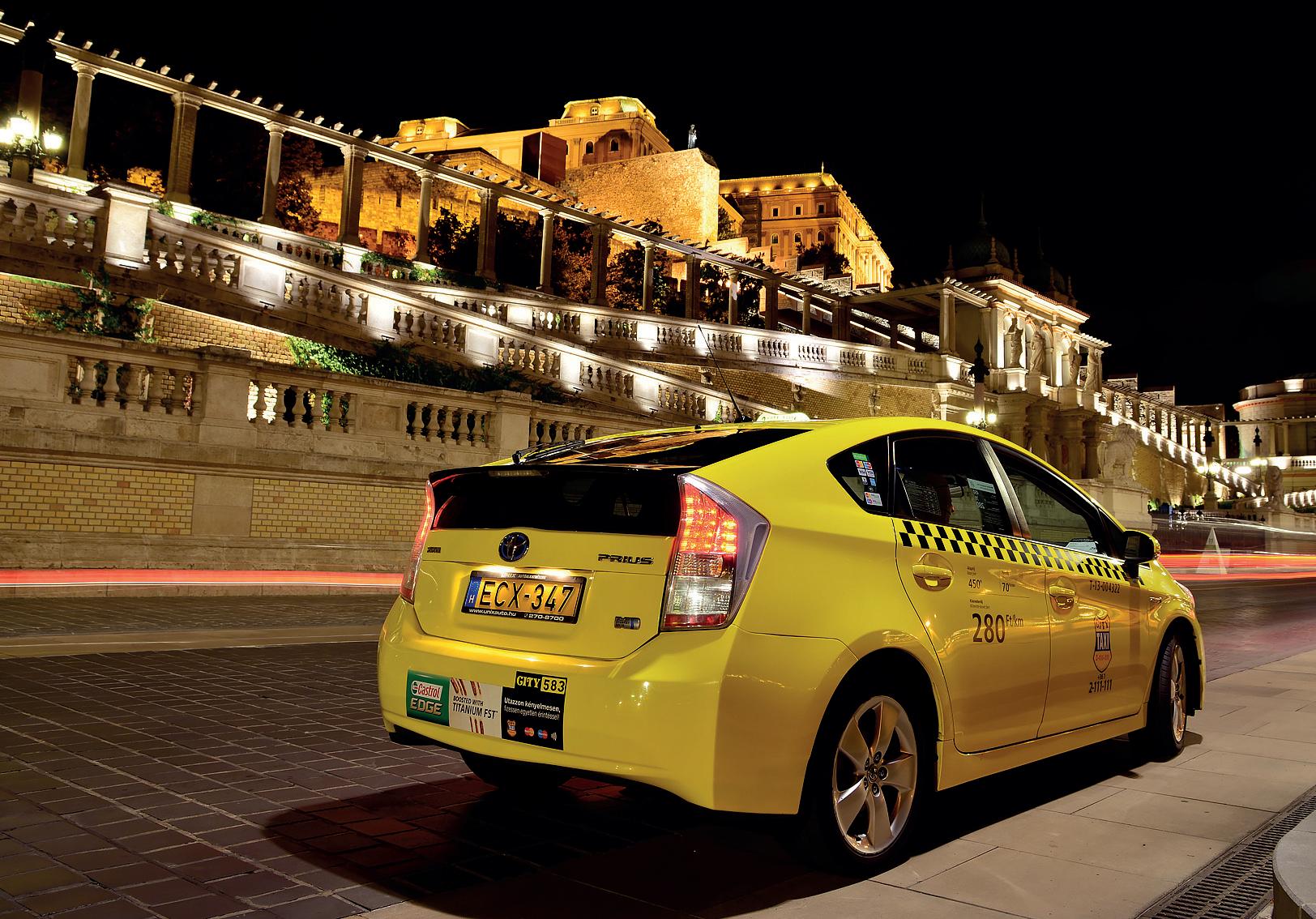
Michelin celebrates its 25th anniversary in Hungary in 2021. Since 1996, when the Michelin Group acquired the tire factory Taurus, the company has been offering sustainable mobility solutions in Hungary. A press statement by the company says that Michelin supports its employees, customers and local communities in a responsible and environmentally friendly way through significant investments and a heritage that goes beyond these 25 years.
Michelin has four sites in Hungary with state-of-the-art infrastructure. These include a tire factory in Nyíregyháza, a logistics site in Vác and Tuzsér and a sales office in Budapest.
Michelin's creativity and innovation is fueled by the talent and diversity of its more than 1,300 employees in Hungary. Its relationship with its employees is based on shared values of respect, dialogue, trust and commitment to high quality products and services. Michelin employees around the world practice these values every day to drive progress for all. In Hungary, Michelin works directly with more than 190 tire dealers who offer its high-end products at more than 450 points of sale nationwide.
Since 1996, Michelin has produced more than 1,088,000 tons of tires at its Nyíregyháza plant. Recognizing the importance of conserving natural resources and the environment in order to operate its business in a sustainable way, Michelin considers the environmental impact of its activities and products from the design phase, throughout the entire life cycle. In Hungary, Michelin has spent over HUF 170 billion on modern infrastructure over the last 25 years, the statement points out.

LARGE-SCALE LEGO EXPANSION IN NYÍREGYHÁZA
In Nyíregyháza, NE Hungary, LEGO Manufacturing is launching an investment, with a total cost of almost EUR 148 million, that will create 250 new jobs and result in a 50% increase in molded elements. The plant's production area will increase to 232,000 square meters. Construction work will begin this summer and production in the new halls is scheduled to commence in 2023. The LEGO factory in Nyíregyháza, inaugurated in 2014, is one of five LEGO factories in the world that has already been expanded and further developed several times since that year. The facility, of almost 160,000 square meters, houses the entire LEGO manufacturing process, from injection molding through decoration to packaging. Most of the DUPLO games are also manufactured here.


As a result of the current development, the factory's production area will increase by 72,000 square meters, as well as additional injection molding modules, packaging and storage areas, and an administrative and energy building. The expansion of production capacity is necessitated by increased demand as well as targeted further growth. As part of the announced expansion, the number of molding machines on the site will be increased by 50% to 1,152. In tandem with this, the packing capacity of the manufacturing site will be increased by 30%, so the amount of ready-made LEGO sets made here will go up by almost one third after completion of the investment.
In addition to increasing the manufacturing capacity, the LEGO Group is also taking measures to facilitate a sustainable operation. The factory in Nyíregyháza installed its first extensive solar panel park this year. The solar park will support the factory by producing enough clean energy to cover the energy needs of 1,000 households. In addition, the plastic prepacks in the LEGO boxes will soon be replaced by paper bags, while some of the molded elements are already being made out of sugarcane-based plastic, the Hungarian Investment Promotion Agency reports.
A large-scale series of developments spanning several years and including the maintenance of the airport taxiway system is under way. This year, as part of the work phase lasting until the fall, taxiways P1-P3, L, R and Q will be refurbished, thus facilitating the safe, efficient, and long-term handling of the increasing traffic.
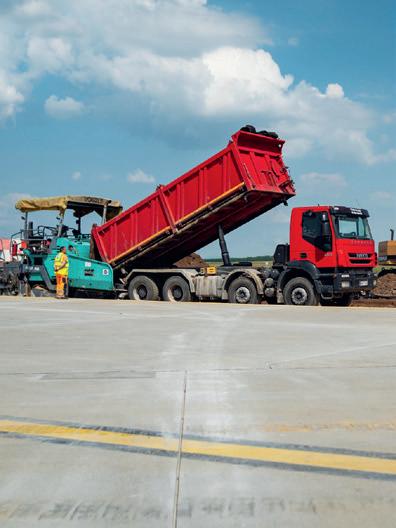
As a press bulletin by Budapest Airport points out, the project is the continuation of EUR 167 million worth of airport developments implemented over the past two years. The value of this project, which is one of many currently under way, has reached EUR 800,000 during this year already.
Utilizing the current, momentarily still moderate traffic, Budapest Airport commenced the works in the busiest areas on the Terminal 2 apron, taking into account factors such as the significant cargo traffic and the expected strong increase in passenger traffic. Budapest Airport phased the developments in such a way that they should not disturb regular passenger traffic at the airport in any way. As was the case during the UEFA European Football Championship, construction works affecting aircraft traffic will be suspended for the duration of any future major events, such as the Eucharistic Congress coming up in September.
The shoulders of the taxiways, the related edge lights, substructures, and elements of the rainwater drainage systems located next to the taxiways will be replaced on approximately 7,000 square meters, and the gullies built into the pavement will also be renovated along a 130-meter section.

As part of major airport development, the project has been preceded over the past two years by major investments such as the air cargo handling complex called the BUD Cargo City, thanks to which the volume of air cargo handled by Budapest Airport is breaking records on a monthly basis, and the modern, spacious and accessible Pier 1 connecting to Terminal 2A.

www.dteurope.com |DIPLOMACY & TRADE| JULY 2021 7 photo by CSABA KRIZSÁN/MTI, MICHELIN, DEPOSITPHOTOS.COM, BUDAPEST AIRPORT/RÓBERT BARANYI
C M Y CM MY CY CMY K Diplomacy-n-Trade.ai 1 2017. 02. 27. 11:22:30
HUF 300 MILLION DEVELOPMENT AT BUDAPEST AIRPORT
WAITING FOR A MIRACLE
BY TAMÁS MAGYARICS
As the saying goes, the Middle East conflict between the Israelis and the Palestinians will be settled either through negotiations or by a miracle. Unfortunately, experts give a higher chance for the latter than the former. Their pessimism seems to be vindicated by the latest events: between May 10 and 21, 2021 the fourth major armed clash was taking place between Israel and such radical Palestinian forces as Hamas and the Palestinian Islamic Jihad. The ceasefire, brokered on paper by Egypt, Qatar, and the United Nations, is as temporary as it can be because nothing has been solved: the outstanding issues – some of them since the late 1940s – are still festering. And, as always, it was not just about Israel and the Palestinians; a number of outside forces were involved, some of them more openly, some less openly. Therefore, the conflict has even more variables than the parties directly involved. Outside influence in – interfering with – these ’local’ affairs has been one of the few permanent features in the past hundred years or so.
Historic claims
The ostensible cause of this latest outbreak of violence touched one of the toughest questions in the relations between the Jews and the
Palestinians. An Israeli Supreme Court decision allowed Jewish families to evict six Palestinian families in Sheikh Jarreh. The area is under Israeli control, and a law allows Israeli land owners to reclaim lands in East Jerusalem that had been owned by Jews before 1948. So far so good, but Israeli laws do not recognize the same rights of Palestinians in Israel or in territories that have been occupied by Jewish state since 1948. The Palestinians responded with throwing stones and other objects at Jews who gathered in the square in front of the Western (Wailing) Wall, under the compound of the al-Aqsa Mosque. The Israeli police forces moved in, and violence soon degenerated into Palestinians launching thousands of rockets against Israeli towns and settlements, while the Israeli Defense Force (IDF) responded with airstrikes against Gaza (and minor ones against areas inside Lebanon). The relatively short-lived conflict demanded the lives of hundreds of Palestinians, over a dozen Israelis, thousands of people got injured, hundreds of buildings destroyed in Gaza, and some 72,000 Palestinians were displaced.
Palestinian internal affairs…
But, of course, there was more than was meeting the eye. The conflict broke out, to a large extent, because of domestic political reasons, especially on the Palestinian side.
The Fatah, under the presidency of Mahmoud Abbas, is ruling the Palestinian entities in the West Bank, but the rather corrupt and ageing leadership has been steadily losing popularity to the more dynamic and radical Hamas. In fact, Hamas won the elections with a relatively comfortable majority in 2006, and President Abbas is not someone who would risk his rule by having another election – which was to have been held on 22 May, 2021. It is needless to say, the Fatah leader instantly postponed the elections citing the outbreak of violence, but the Hamas leaders would have none of it, and are talking about a ’coup.’ For sure, Hamas was poised to win the election, especially because of the huge support among the young. So, without attributing to any ulterior motives to Mahmoud Abbas, the eruption of violence came handy for his party.
…and those in Israel
The Israeli domestic political scene was equally volatile with repeated Knesset-elections, which produced no clear winners. Showing force, in general, appeals to a lot of Israelis, especially on the right, and Benjamin Netanyahu is not a politician who shrinks from demonstrating the superior Jewish technology in these conflicts. In addition, his commitment to the controversial settlement policy in the West Bank has earned
a lot of supporters too. As it turned out, he was not able to retain his office, and had to step down in mid-June. The above should not be interpreted in a way that Naftali Bennett, the current Prime Minister, and his successors, no matter who they be, will not be doing their best to protect Israel’s (perceived) interests by force if necessary.
Other players in the conflict
One outside actor which must have been watching carefully the duel between the Palestinian rockets and the Israeli Iron Dome was, among others, Iran, one of the patrons of Hamas. The Palestinian barrage of some 4,300 rockets may have been a test run of the efficiency of the Israeli defense capabilities; in reality, some 90% of the incoming missiles are reported to be destroyed by the elements of the Iron Dome system. (The figures on both sides should be treated with some caution; the war was extended to the media and to the public [dis]information field as well.)
Of course, the single biggest outside force in the Middle East is the U.S. The Biden administration was continuing its predecessors’ policy of monopolizing and controlling any attempt to produce a settlement. In fact, this policy is not pursued only in situ; Washington has been bent on preventing other major forces from acquiring a significant role in the Middle East (the origins go back, at least, to the Eisenhower doctrine in January 1957). It also means that the UN Security Council actions are also subtly blocked for fear of Russian and Chinese interference with the region. In effect, Israel is also suspicious of all outside forces except for the U.S. It is now having some reason even to question the long-standing unequivocal American support given the political dynamics within the Democratic Party, in which the ’Young Turks’ (in fact, Somalis, Palestinians, etc.), a.k.a the Progressives, are putting pressure on the ’Old Guard’ so that the latter should be more critical of Israel. Recently, it has been the European Union that has started to take a more and more friendly position towards the Palestinians; this quasi about face can be attributed, in part, to the increasing number of refugees of Muslim religion in Western Europe, and quite a few West European politicians are openly courting their support for – rather short-sighted – political gains, and are willing to condemn Israel if conflicts erupt between Israel and the Palestinians.
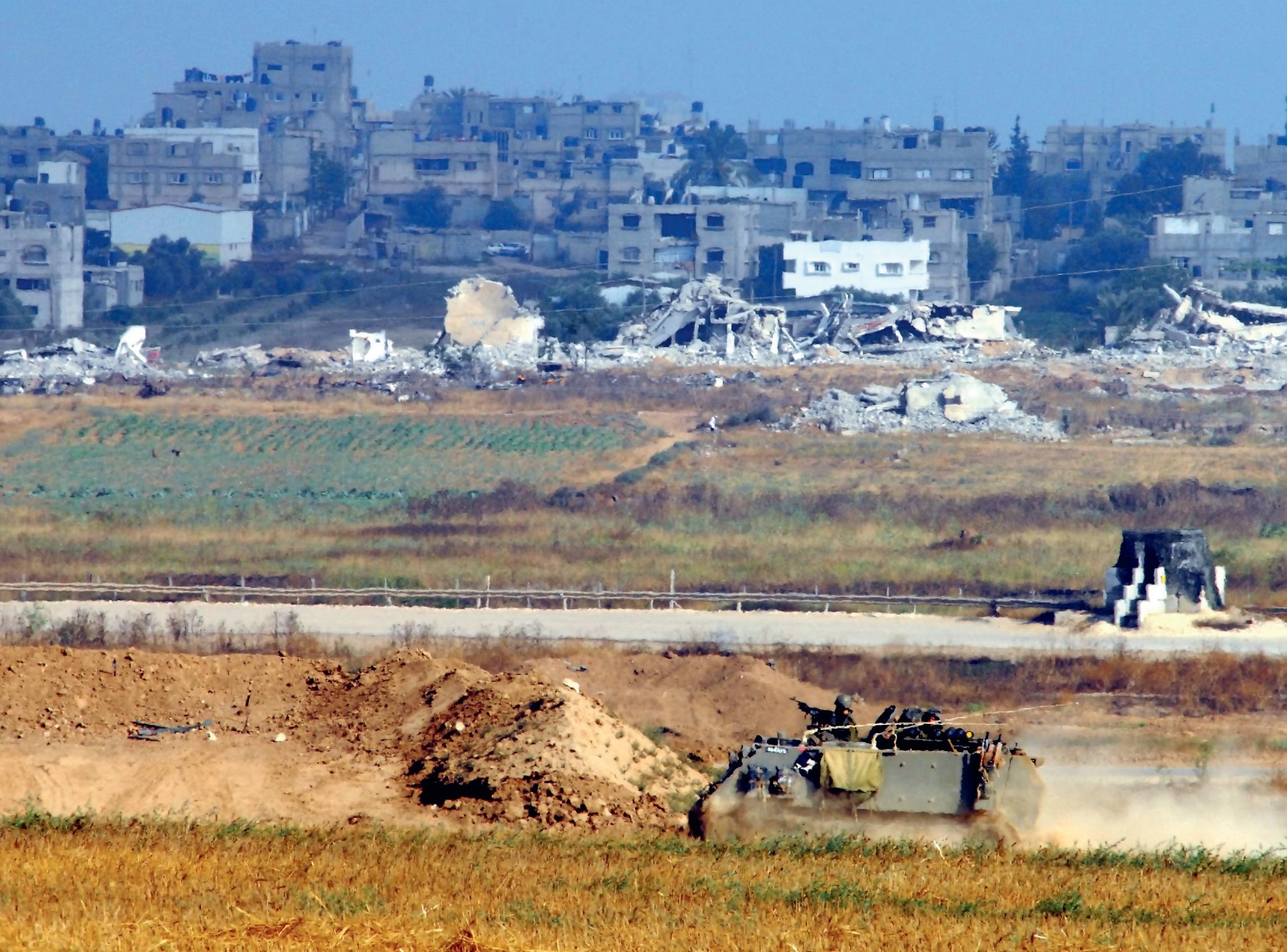
Miracles – things of the past
The Middle East is the land where most of the miracles happened according to religious writings, chronicles, histories, myths, and traditions. The land is in need badly to experience another one – this time in the form of a lasting settlement between the Israelis and the Palestinians. However, the reality is that in modern times we are likely ’waiting for God(ot)’ in vain.
JULY 2021 |DIPLOMACY & TRADE| www.dteurope.com analysis 8 photo by RAFAEL BEN-ARI/CHAMELEONS EYE/DEPOSITPHOTOS.COM
Tamás Magyarics is a foreign policy analyst
YET ANOTHER CHAPTER IN THE ISRAELI-PALESTINIAN CONFLICT
analysis
CHINESE BANKING IN THE CEE REGION
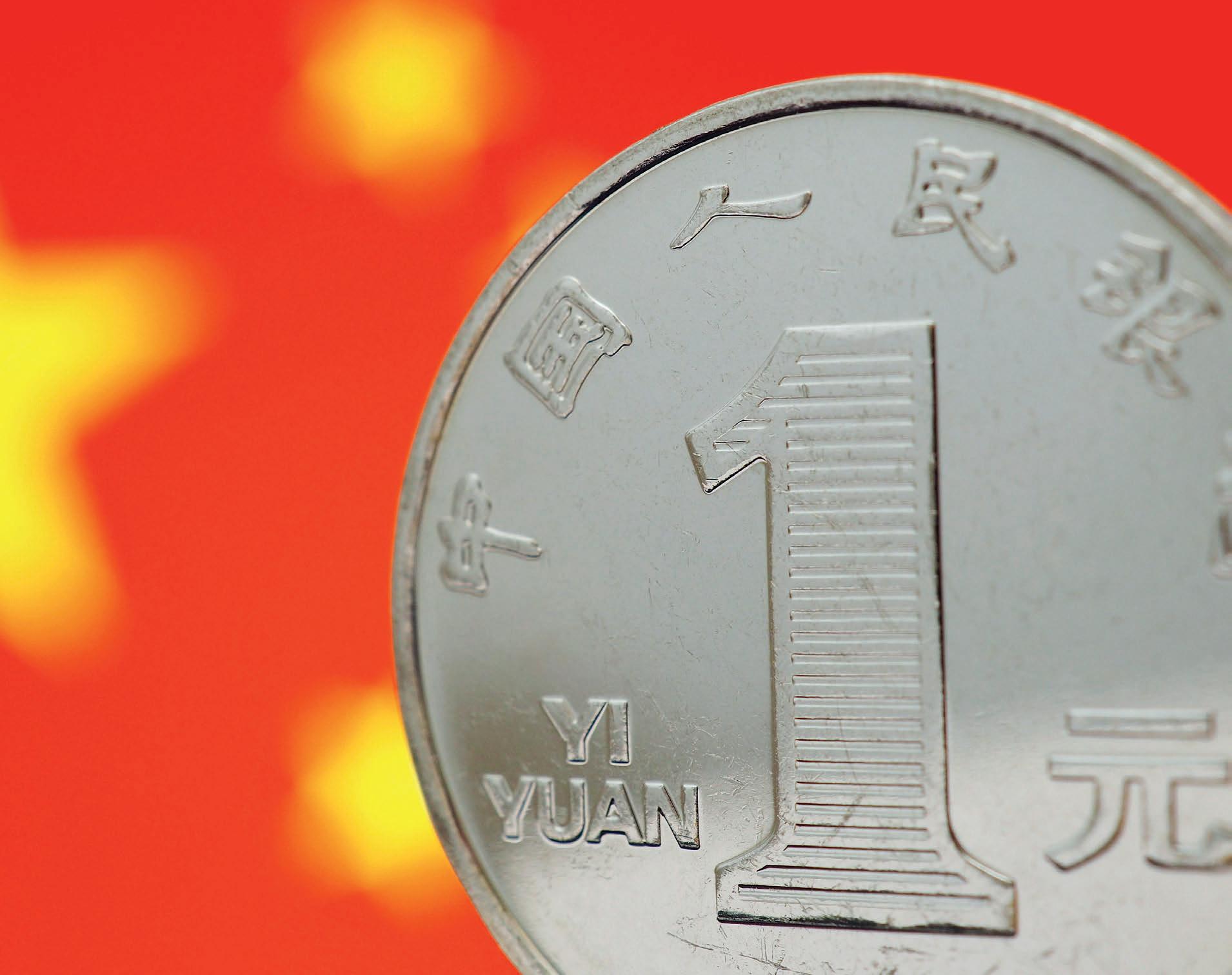
The Balkans Silk Road
In recent years, the Czech Republic and Hungary became the main targets of Chinese investment. According to CzechInvest, China became one of the top five foreign investors in the Czech Republic, reaching EUR 568 million in capital. China’s position was strengthened further with Xi Jinping’s 2016 visit to Prague, where the two countries signed a strategic partnership, which included a EUR 7.39 billion investment package until 2020.
The importance of Hungary in the Chinese regional strategy grew significantly after the purchase of the Greek port of Pireus by China COSCO Shipping. Since then, China’s goal was to establish a land transportation route between Pireus and Western Europe, most importantly, a railway crossing the Balkans, of which Hungary would be the entrance point to the EU and the Schengen Zone.
Hungary, Czechia, as well as Poland, now host branches of two large Huijin-owned banks, the Bank of China and the Industrial and Commercial Bank of China. While the BOC offers limited personal banking services, the main purpose of both companies in the region is bond IPOs and investment financing.
Controversial financing
While initially, financing of BRI infrastructure was done directly through government-owned funds, this role was gradually taken over by Chinese commercial banks. On one hand, banks like the BOC and the ICBC offer domestic lending to the major Chinese corporations that partake in infrastructure construction abroad. On the other hand, their local branches offer direct funding to ongoing BRI projects in the target country (often through issuing Silk Road bonds locally). As a result, the typical BRI project’s completion is largely removed from the local market, as financing and realization are mostly done by Chinese entities. A good example of this is the modernization of the Budapest-Belgrade railway, the flagship project of BRI in Hungary and Serbia. The tracks are mostly constructed by Chinese companies, and the Serbian and Hungarian parties are taking out from Chinese financial institutions loans to cover the cost. That way, all the major aspects of the project are controlled by Chinese actors.
BY ZALÁN ZUBOR
In early 2020, the Hungarian National Bank has announced the registration of a new credit institution in the country, the local subsidiary of the China Construction Bank, which immediately agreed to partake in the central bank’s Renminbi Initiative, the introduction of dual RMB (the Chinese currency) and HUF bank accounts. Like others in China’s ‘big four’ banks, most of the Construction Bank’s shares are controlled by the Chinese government holding, the Central Huijin Investment Company. This is not the first instance that Hungarian financial authorities cooperate with a Chinese state-owned bank. In November of 2019, Hungary signed a strategic cooperation agreement with
the Industrial and Commercial Bank of China (ICBC). In the official statement announcing the agreement, they stated that the ICBC plans to strengthen the Belt and Road Initiative (BRI), the Chinese government’s geostrategic effort to dominate Eurasian trade through infrastructure development. The two parties stated the initiative may further be aided by the opening of a regional ICBC office in Hungary, as well as financing projects like the Chinese-built Budapest-Belgrade railroad.
Growing interest
In recent years, leading Chinese banks (which are, based on market capitalization some of the largest companies in the world) have strengthened their presence in the broader
Central-Eastern European region. CEE countries first became attractive to Chinese investors after their ascension into the EU. By 2012, China established the ‘17+1’ cooperation, involving 11 regional European union member states and five Western Balkan countries, to further economic cooperation. This cooperation has often been described as a hollow shell, or more charitably, as a collection of bilateral relations with no organizational framework or central strategy.
Nevertheless, this framework did yield results in some states, namely, the four Visegrád countries who, together with Romania, comprise 80% of overall trade volume among the 17+1 countries. China is increasingly interested in the region, which is seen as of strategic importance for the Eurasian trade routes to be established within the BRI. This is best shown by the fact that the latest 17+1 summit held on February 2021 was the first such meeting headed by President Xi Jinping instead of Premier Li Keqiang.
A common criticism of the BRI in the region was that, apart from the creation of infrastructure necessary for moving Chinese products, it failed to invest in beneficial infrastructure (such as promised but eventually halted investment into nuclear and hydropower in Romania and Czechia), or job creation. Despite the strategic agreements, few Chinese companies tap into local labor and consumer markets. For example, the latest major investment in Hungary was Wanhua’s 2011 acquisition of Borsodchem. Instead, BRI’s main interest remains access to Western markets. Additionally, some West Balkans countries are wary of establishing too strong ties with China, lest they risk their NATO and EU integration. Security concerns already prompted some CEE nations to sever ties with Chinese companies in energy and IT investments. Such hurdles already pushed the completion of BRI projects, including the Budapest-Belgrade railway further in the future. Although Huijin banks continue to provide a stable financial background, the creation of BRI’s Balkans road and CEE trade network may be delayed even further.
www.dteurope.com |DIPLOMACY & TRADE| JULY 2021 9 photo by DEPOSITPHOTOS.COM
CHINA’S MAIN INTEREST REMAINS ACCESS TO WESTERN MARKETS
In recent years, partially state-owned Chinese banks established a presence in the Visegrád countries, mainly to aid Belt and Road projects, which started facing obstacles in recent years.
EMBRACING DOMESTIC PRODUCTS AND THE ENVIRONMENT
SPAR HUNGARY CELEBRATES 30-YEAR ANNIVERSARY

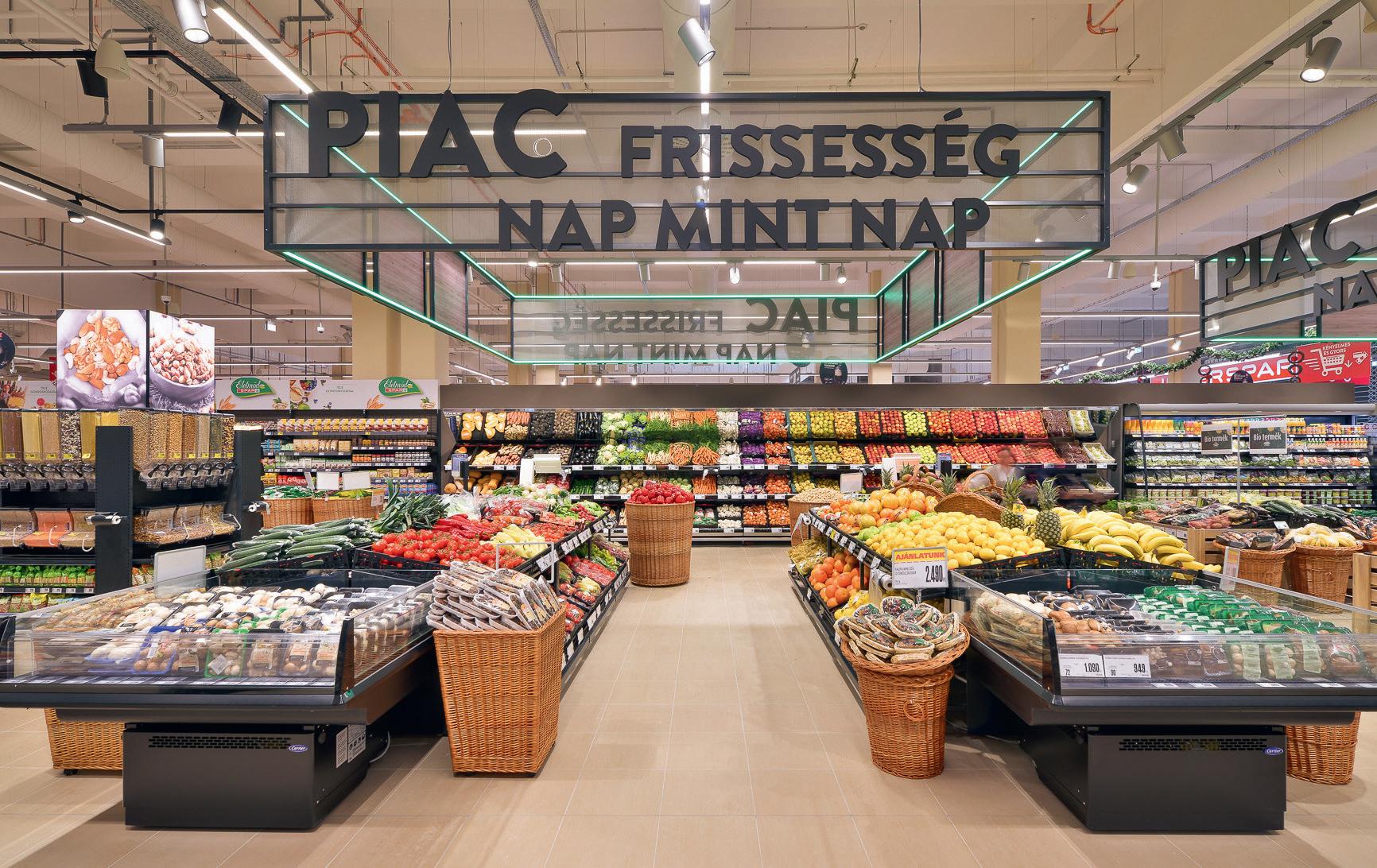
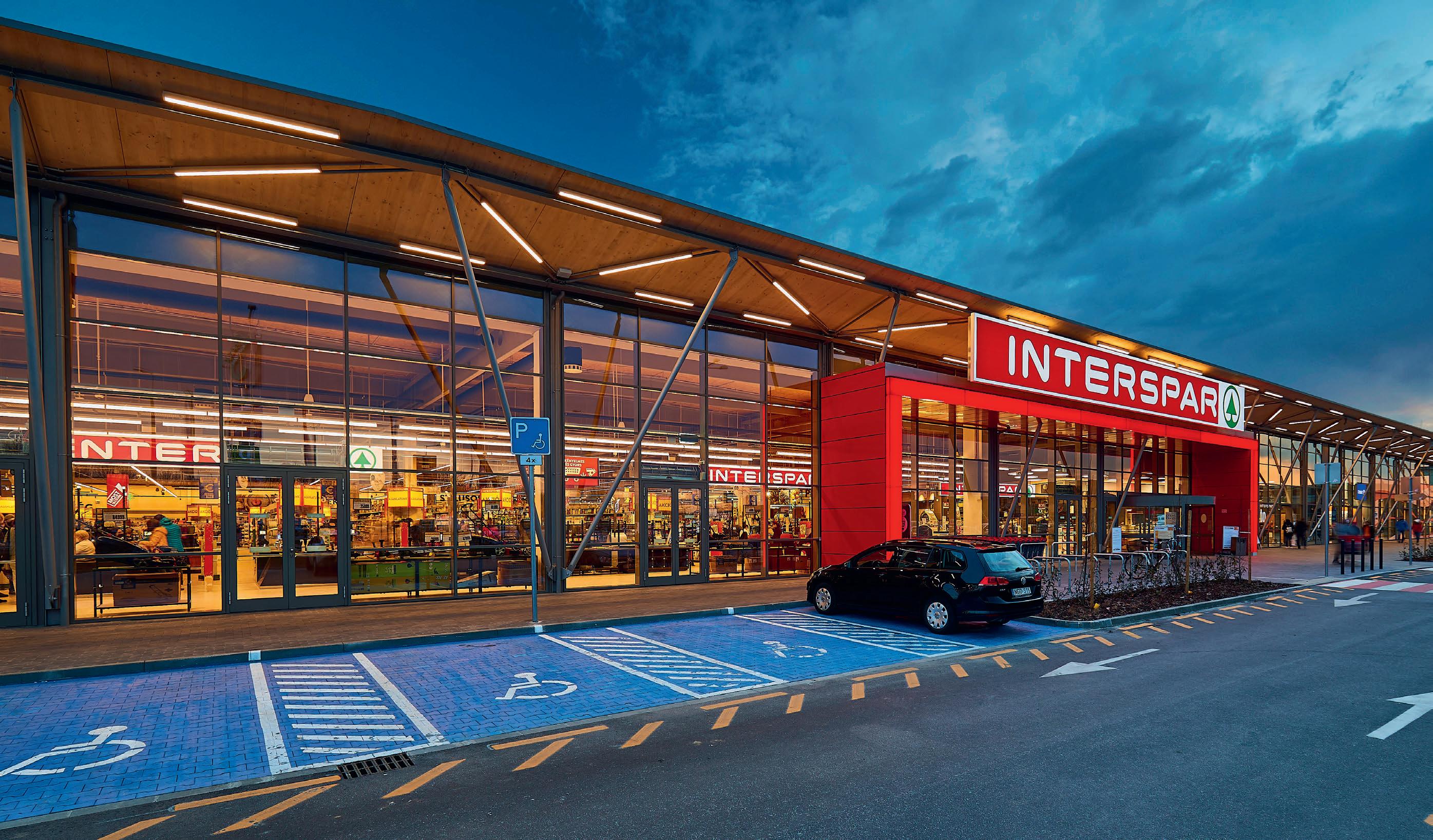
SPAR Hungary has been an important player in the Hungarian economy and retail trade for three decades. As one of the largest employers in Hungary, it provides jobs for nearly 13,000 people and supports family businesses, producers and farmers operating in Hungary. The company, which is celebrating its anniversary, adapts to consumer needs by keeping pace with modernization in the spirit of environmental and social sustainability.
"Over the past thirty years, our company has contributed more than HUF 400 billion to the country's development, and more than one billion in total to various social, environmental, sports, educational and cultural causes. We started with just 50 employees and now, we are proud to offer a secure livelihood to nearly 13,000 people, for whose achievements we are particularly grateful. And nothing shows our Hungarian connection better than the fact that more than 90% of the food products in SPAR are sourced from companies operating in Hungary, because helping domestic agriculture and food processors – family businesses and Hungarian farmers – to market their products has long been a priority for our supermarket chain," Márk Maczelka, Head of Communications at SPAR Hungary points out.
All across the country
SPAR Hungary started its operations in 1990 and its first supermarket store was opened in Tata, west of Budapest, in 1991. Over the past three decades, the store network has expanded to 588 outlets, thanks to HUF 647 billion of investment over the years. The supermarket chain has grown year on year in Hungary and has become a major player in the Hungarian retail sector. Last year, SPAR had a total of 381 company-operated stores: 324 SPAR supermarkets, 23 City SPAR supermarkets and 34 INTERSPAR hypermarkets. Another important step in this development was the opening of popular franchise units in four additional formats nationwide: SPAR partner, SPAR market, OMV-SPAR express and LUKOIL-DESPAR. The number of franchise
JULY 2021 |DIPLOMACY & TRADE| www.dteurope.com 10
anniversary photo by ZSOLT MOLNÁR, BÉLA TŐKE
stores reached 207 in 2021, compared to two in the start-up year, and they are located in 94 municipalities all across the country.
Embracing domestic products
The company's business policies and practices in support of the Hungarian economy have long been a priority. The proportion of SPAR's domestic suppliers has ranged between 85% and 90% over the last ten years, with 89% of the value of purchases in 2020 coming from domestic partners. In a time of pandemic, the company says it is particularly important to protect and stimulate the domestic economy, and SPAR has demonstrated its commitment to this by joining the Hungarian Product Nonprofit Ltd.’s campaign to buy domestic products and by launching the ‘Hungaricool by SPAR’ product innovation competition, which is unique in the Hungarian retail sector and embraces domestic product development.
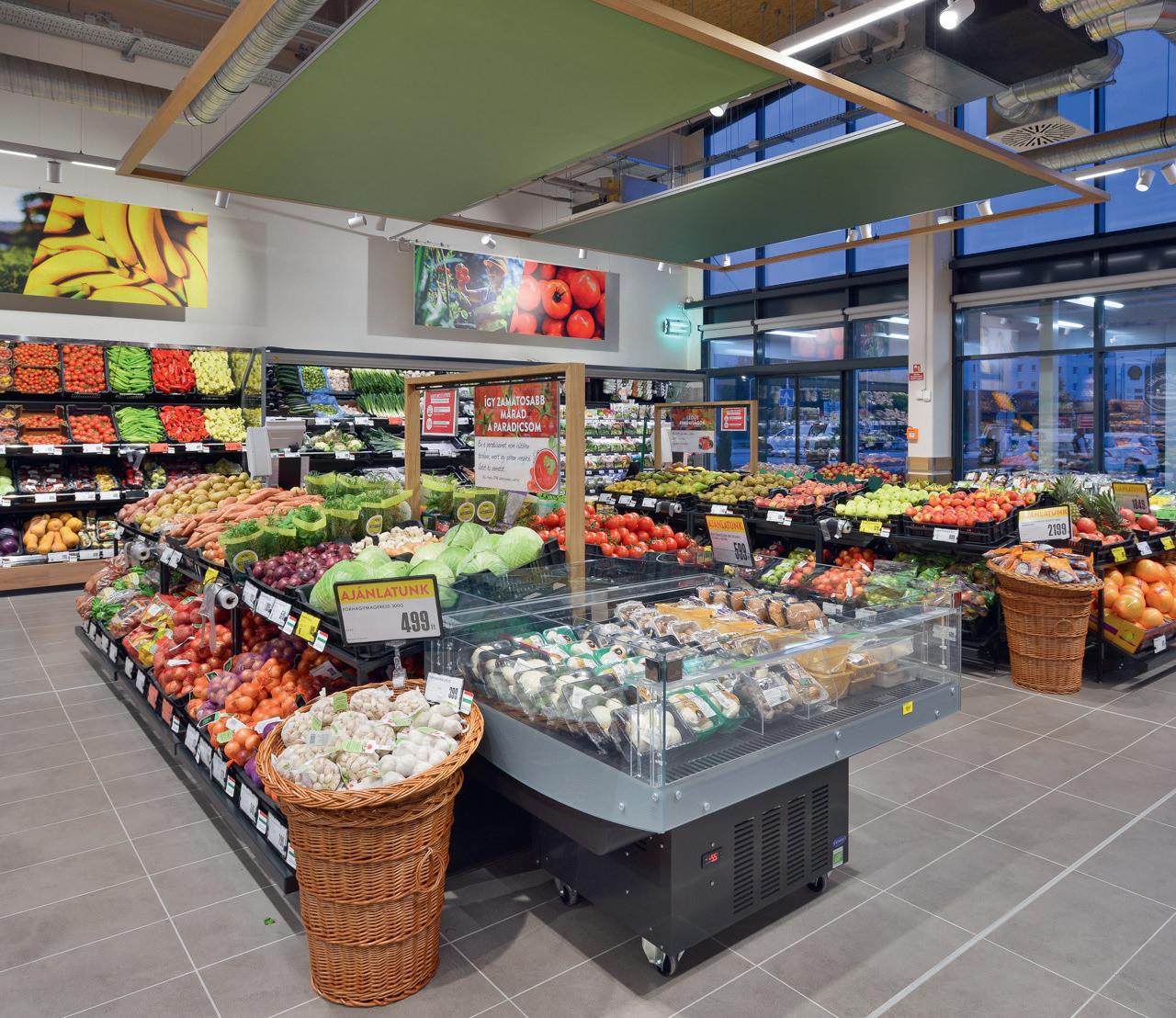
Convenience products from meat plants
In parallel with the continuous and significant expansion of its network, the high-volume sale of fresh meat and meat products laid the foundations for the establishment of the Regnum meat plant in 2004. In response to the growing demand, the company decided to expand its production capacity and acquired the ZIMBO Perbál Meat Processing Ltd. plant (in Perbál, northwest of Budapest), which now operates under the name Regnum Meat Plant Perbál. In 2020, the meat plants employed 368 people. As consumer demands have changed, the need for both fast and quality meals has increased, and the expansion of convenience products was a priority in the company's product development in 2018. To support this, the company has established the ‘SPAR enjoy. convenience’ plant in Üllő, southwest of Budapest. After two years, production output has doubled, and the new unit has generated a total of HUF 3.2 billion in revenue over the past three years.
Own brand: quality and reliability
For decades, SPAR has been committed to developing its own-brand range: in addition to increasing volumes, the use of quality and the highest possible proportion of domestic ingredients is a key priority. The range is expanding year on year, with more than 3,600 own-brand products from 31 product lines now available on store shelves. In addition to developing quality products that are also easy on the wallet, the company attaches great importance to the distribution of domestic products. When developing new private label products or repackaging existing products, the possibility of using the trademark is always discussed with the partner. This is one of the reasons for the dynamic growth in the number of own-brand trademarked products.
Charity in many walks of life
As a testimony to its active participation and responsibility in the social life of the country, SPAR donated more than HUF 186 million to a variety of causes last year. The year 2020 was
also special in terms of social involvement: the ‘Joy to Give!’ Christmas charity campaign, with which SPAR has been helping people in difficult circumstances for more than 20 years, took a different form. In December, the fundraising campaign, coordinated by the Hungarian Charity Service of the Order of Malta, enabled customers to support people in need by buying donation cards. At the end of the campaign, SPAR made an unusual contribution to increase the amount collected: it doubled the value of the donations made by customers, thus, the 2020 ‘Joy to Give!’ campaign ended with a total donation of HUF 36 million.
Despite the epidemic situation, the 35th SPAR Budapest Marathon® Festival, where the company was again the main sponsor, attracted many sports-loving people. The sporty day was not without charity either: as in previous years, the retail chain donated the entire proceeds from the Regnum meat plant stand to the Hungarian Charity Service of the Order of Malta. The company also supports a number of smaller partners every year, as well as giving NGOs the opportunity to apply for funding, thus helping local causes.
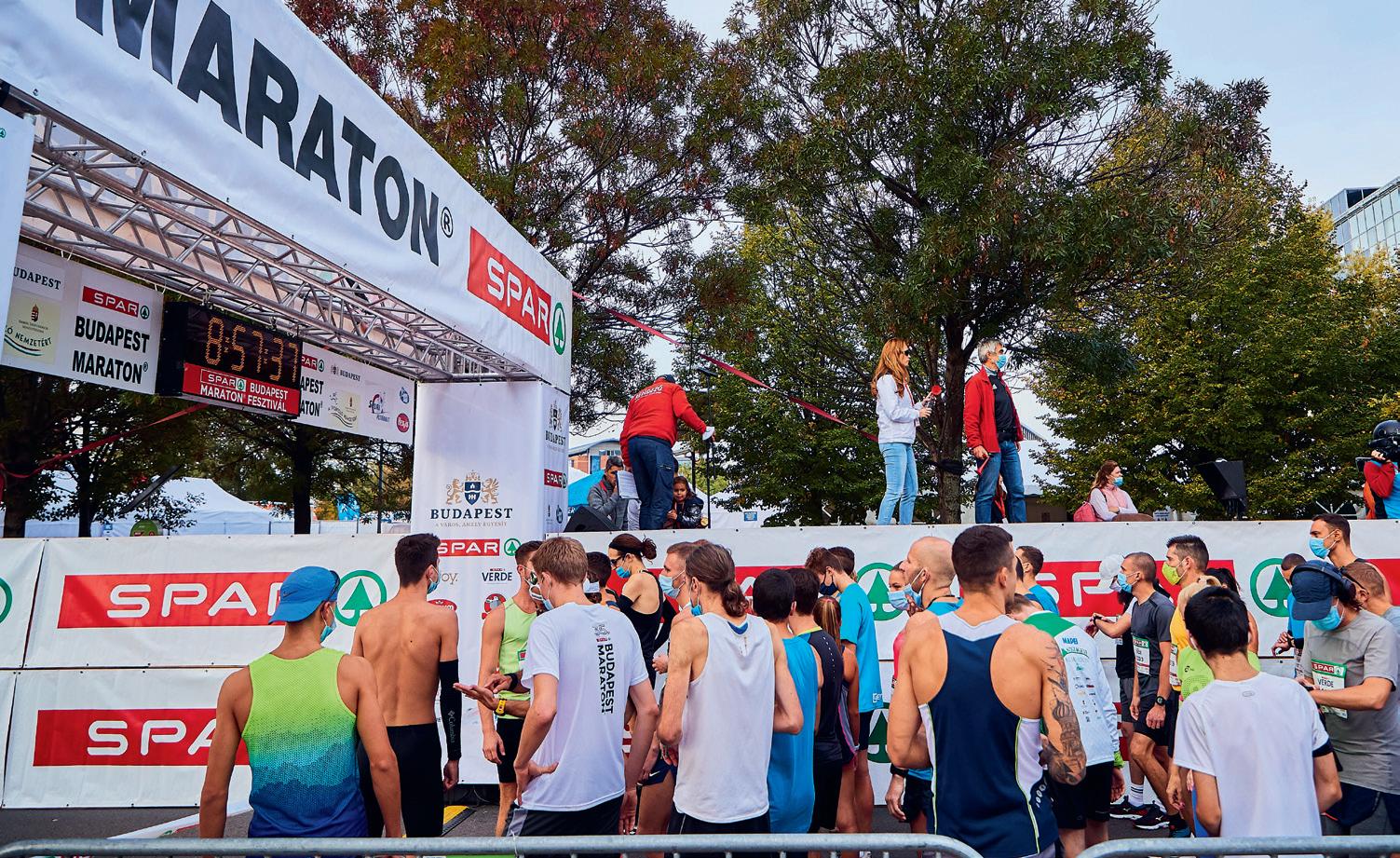
SPAR Hungary is also committed to equal opportunities. For five years, the company has been working with the farm ‘Janka Tanya’ in Tótvázsony, near Lake Balaton where young people with autism are welcomed by the nearby Veszprém INTERSPAR in 2-3 times a week to stock and store goods. A film about the joint work was shown on several Hungarian television channels.
Although it cannot be considered a classic charity action, the initiative, which was implemented in professional cooperation with the Agricultural Marketing Center, is unique in Hungarian trade and its main objective is to support Hungarian product innovations. In the Hungaricool by SPAR competition, the organizers were looking for creative food products with sustainability in mind. The innovative and inventive products with original flavor combinations are now available in INTERSPAR stores and the SPAR online shop. This year, the company carries on supporting competition by joining the popular business show ‘Among Sharks’ (shown on the country’s most popular commercial television channel RTL Klub and known internationally as Dragons' Den or Shark Tank), where internationally renowned investors will evaluate the developments.
SPAR FOR THE ENVIRONMENT –SUSTAINABLE DEVELOPMENTS AND INNOVATIONS
Meeting the needs of responsiblyminded customers and educating society through the introduction of ‘green’ solutions in the shopping experience is essential for SPAR Hungary. As part of its sustainability efforts, the company is continuously reducing plastic waste. Over the years, its strategy has been to take a number of steps to reduce the amount of disposable plastic waste generated. The SPAR Group has now reduced this even further by eliminating the use of caps and lids for some own-brand milks and creams, plastic packaging for certain vegetables and fruits, and replacing the use of own-brand SPAR cooking oil bottles. As well as making the materials, technologies and processes used in its operations more sustainable, SPAR is also encouraging its customers to be more environmentally conscious. With more and more talk of sustainable living and sustainable transport, the company is also encouraging consumers to consider how big their household's ecological footprint can really be. That's why it has partnered with Nestlé to produce the ‘How to be an environmentally-conscious shopper 2020’, a booklet with useful tips and guides to help consumers make environmentally conscious choices.
As demand for food rebounded during the epidemic, the number of online purchases increased by 15% in the first quarter of 2020, but due to increased consumption, unfortunately, more household waste and wasted food may end up in the trash. While there is more and more talk about a sustainable lifestyle, sustainable transport, many still do not rethink the ecological footprint of their own household. Therefore, Nestlé and SPAR formed a partnership to create the booklet in which they help customers make environmentally conscious decisions with helpful tips and guides.
SPAR takes an active and pioneering role in matters affecting the future of the Earth, and one of the cornerstones of its business philosophy is environmentally conscious corporate governance. The retail store chain is using more and more environmentally friendly solutions, from waste management through logistics to advertising, and is also involving its customers in their operation. As a result, the amount of plastic packaging has decreased and more and more recyclable paper has been used. Waste glass collection islands became available in several places and the weight of the flyers was also reduced. Under the SPAR program for a sustainable future, SPAR, as a responsible company, focuses primarily on areas where it has already achieved significant results with customers and partners. These include the environment, health, food safety, worker safety and helping disadvantaged members of society. SPAR also regularly initiates and participates in campaigns to raise awareness against food waste.
anniversary www.dteurope.com |DIPLOMACY & TRADE| JULY 2021 11
diplomacy - sports
NEW AMBASSADORS
ESTONIAN EMBASSY CELEBRATES VICTORY DAY

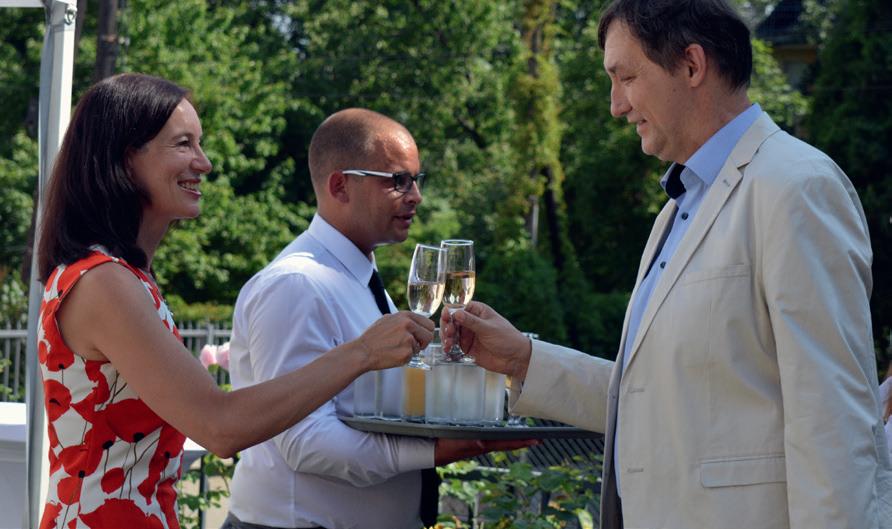
Attended by dozens of fellow ambassadors and other guests, the event was the first major diplomatic reception in Hungary after the pandemic lockdown came into force in March 2020. Victory Day has been celebrated since 1934 and marks the victory of Estonia and neighboring Latvia in the Battle of Cēsis against the Baltische Landeswehr on June 23, 1919. As Ambassador Karelsohn pointed out in her speech, this year also marks 100 years of diplomatic relations between Estonia and Hungary. Hungary recognized the Republic of Estonia de jure on February 24, 1921, marking the start of diplomatic relations between Estonia and Hungary.
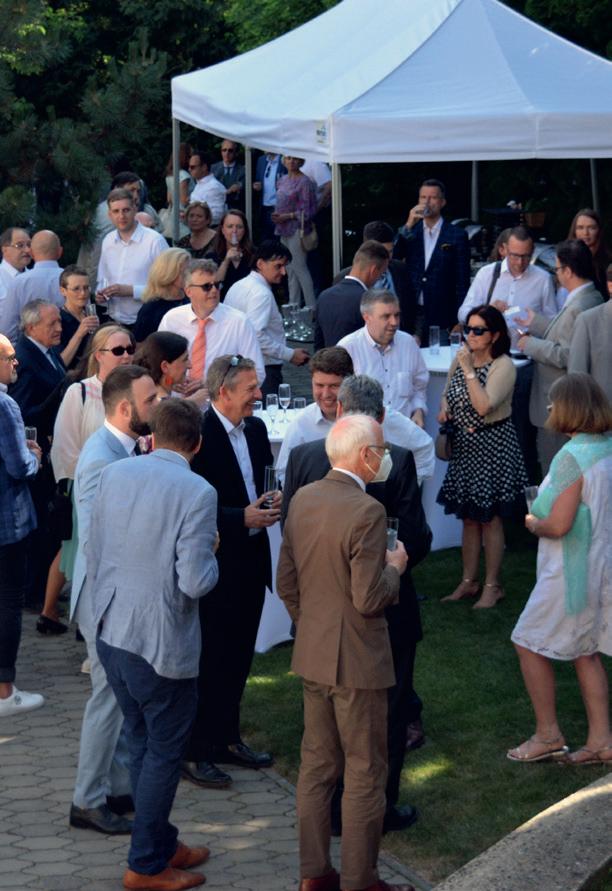

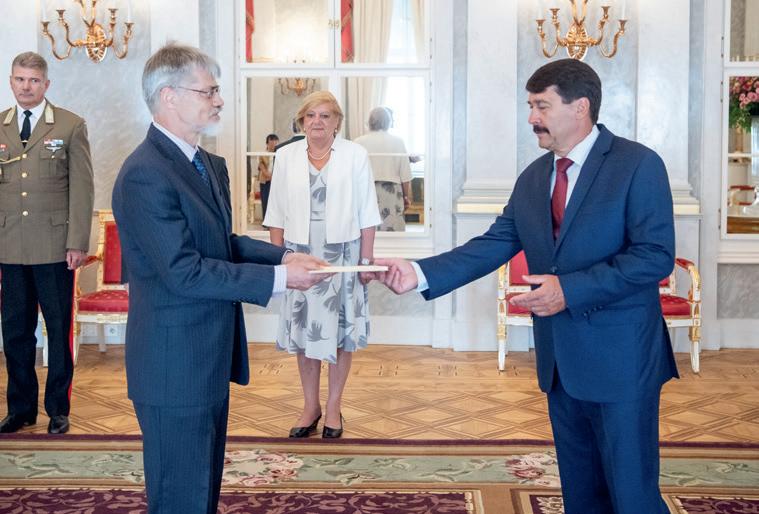
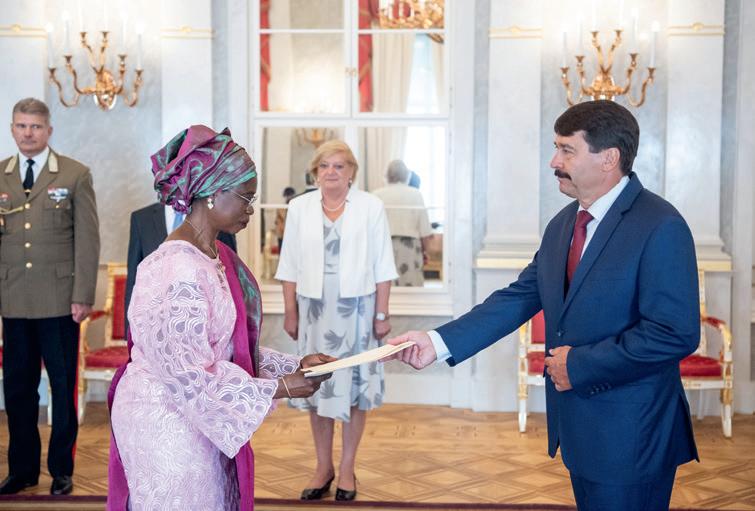
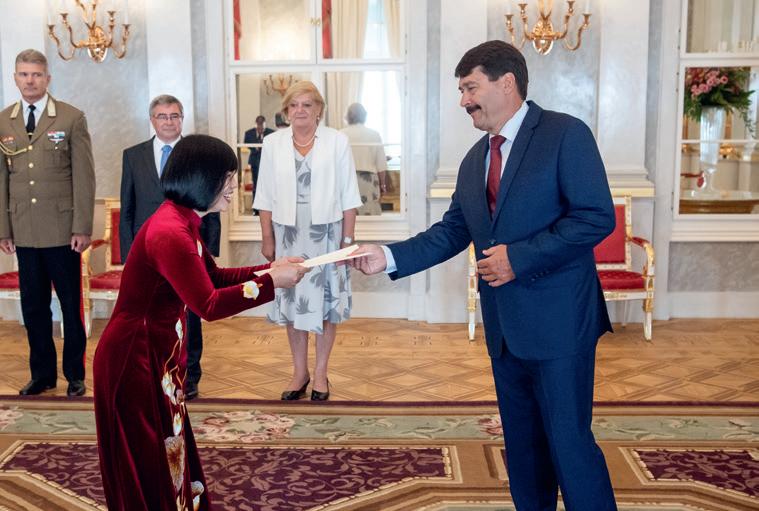

PUTINTSEVA WINS HUNGARIAN GRAND PRIX
INTERNATIONAL WOMEN’S TENNIS TOURNAMENT RETURNS TO THE RÓMAI TENNIS ACADEMY AFTER EIGHT YEARS IN ‘EXILE’
Top seed Yulia Putintseva of Kazakhstan won the singles title at the USD 235,000 WTA Hungarian Grand Prix women's clay court tennis tournament in Budapest. Hungary’s Fanny Stollár – with her Romanian partner – is the winner of the doubles event.

The Római Tennis Academy in Budapest was the venue of an international tournament between 1996 and 2013 as part of the series organized by the Florida-based Women’s Tennis Association (WTA). For economic and administrative reasons, Jenő Márky, the owner of this WTA sanction, had to organize the event outside the country (in the Romanian capital, Bucharest) for the coming years. By 2021, he managed to bring the tournament back to the Római Tennis Academy he owns.
In two easy sets
26-year-old Kazakh Putintseva, who was born in Moscow and lives in Florida, is ranked 42nd in the world, was the clear favorite to win the final at the Asbóth József Stadium at the Római Tennis Academy. Her only previous WTA trophy was won in 2019 in Nuremberg, also on clay. Her 24-year-old Ukrainian opponent, Anhelina Kalinina who is career-high 95th in the WTA rankings, had her greatest achievement so far this year by qualifying for the second round of Roland Garros by beating three-time Grand Slam champion Angelique Kerber of Germany.
Putintseva – who changed citizenship from Russian to Kazakh in 2012 – went up 3:0 early in the first set by breaking her opponent’s service game twice. Kalinina managed to produce a rebreak but Putintseva, who has three Grand Slam
quarter-final titles to her name, took the first set after three quarters of an hour.
In the second, Kalinina made a lot of errors, losing games after games and barely hitting the court with her strokes, losing the set 0-6. The unexpectedly one-sided final lasted 1 hour 10 minutes. Yulia Putintseva receives USD 29,200 and 280 WTA points for the second WTA trophy of her career.
Hungarian-Romanian victory
In the doubles final, Hungary’s Fanny Stollár and Romania’s Mihaela Buzarnescu defeated Spain’s Aliona Bolsova and Tamara Korpatsch of Germany in two straight sets.
The first, 35-minute set was dominated by service breaks as the Hungarian-Romanian duo lost their service game three times, while the Spanish-German pair did that four times and thus the latter lost the first set 4-6. Bolsova and Korpatsch were not in control of the second set, either and as a result, the HungarianRomanian duo quickly took a 3-0 lead. Their opponents produced a re-break, however, after 3:1, Stollár and Buzarnescu kept their break advantage throughout the set to take the Hungarian Grand Prix 2021 championship title. For Stollár, who did not make it to the singles main draw from the qualifiers, it was her fifth WTA doubles final and her second tournament victory.
JULY 2021 |DIPLOMACY & TRADE| www.dteurope.com
12 photo by ZOLTÁN BALOGH/MTI, EMBASSY OF ESTONIA, JOHANNA VÍG/RTA
Four new ambassadors accredited to Hungary presented their credentials to Hungarian President János Áder at the Sándor Palace in the Buda Castle in July (pictured clockwise from top left): Modupe Enitan Irele of the Federal Republic of Nigeria, Manuel Jacoangeli of the Italian Republic, Thi Bich Thao Nguyen of the Socialist Republic of Viet Nam and Dr. Marjan Cencen of the Republic of Slovenia.












































TAKENAKA EUROPE GmbH HUNGARY BRANCH OFFICE Architecture / Engineering / Construction www.takenaka.eu info@takenaka.hu
ASPIRING TO FINE FORM for a future generation
witty leaks
WITTY
LEAKS
GREENENVIRONMENTFOR GREENDISCUSSIONS
HISTORY OF THE NETHERLANDS EMBASSY RESIDENCE IN BUDAPEST
BY
THE AMBASSADOR OF THE NETHERLANDS, RENÉ VAN HELL

Located in a small street of District 2 in Budapest, shaded by robust trees, a middle-sized villa gives home to the Dutch ambassador’s residence. The building has an intriguing historical background. The story of the occupants of the house is a bit of a mirror of Hungary’s recent history.

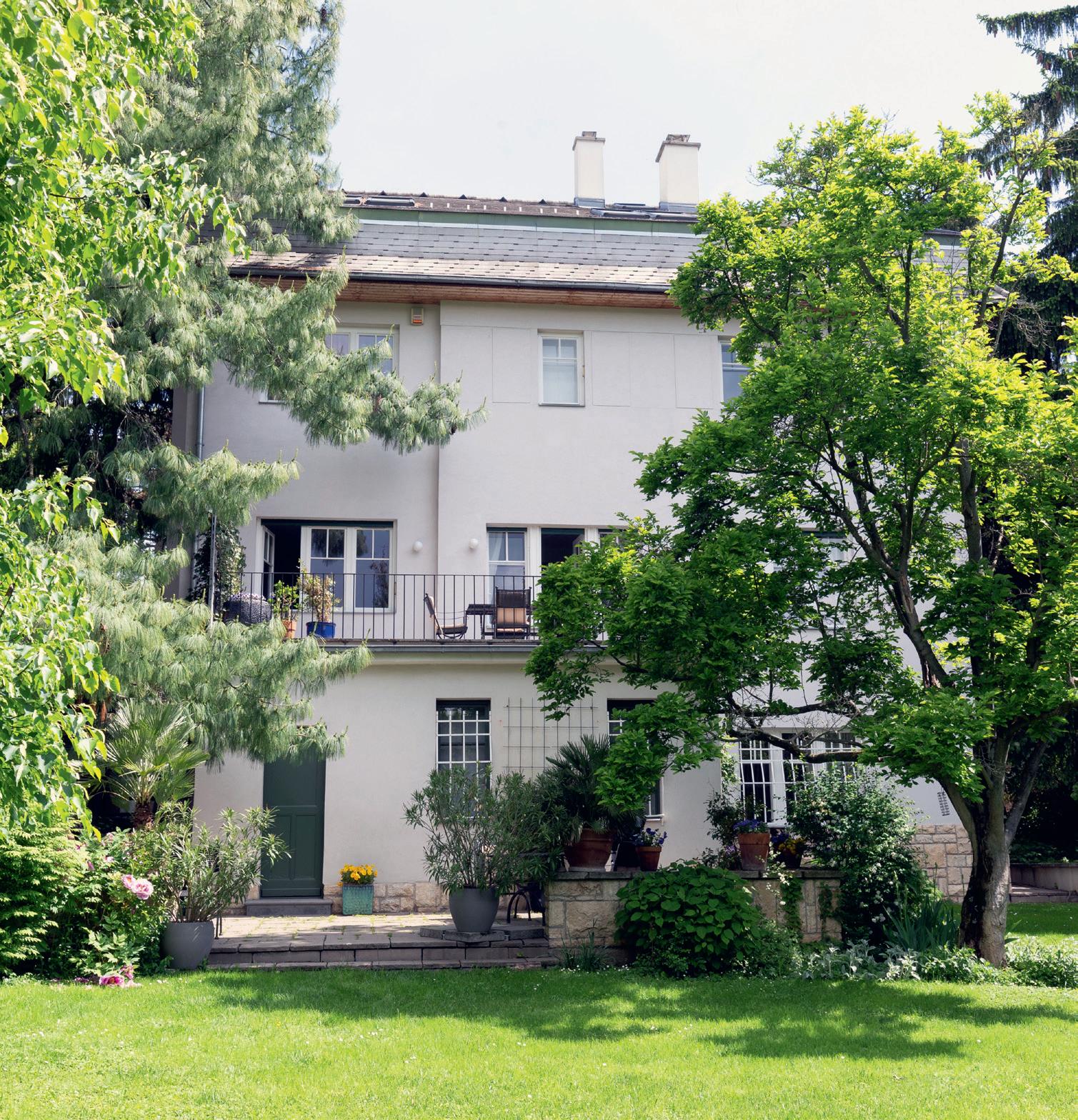

Changing famous hands
The house was built in the early 1930s as a family home for a Jewish couple Mr. and Mrs. József Braun who perished in 1944. The original house comprised just the current ground- and lower ground floors. In 1940, a garden room with a terrace above it was added. After the war, the building was nationalized, presumably in 1948, and then, it was divided into four flats to house military personnel. In the 1990s, the house was taken over by the Hungarian Army and used by ‘comrades’ of the communist party of Hungary. At some later stage, General Bertalan Farkas, the Hungarian army officer famous for visiting the Russian Mir space station in the 1980s as part of the USSR’s friendship program and thus, being the first Hungarian in space, and later a politician, moved into the house. He bought it from the Army in 1998.
Restoring to original character
The current owners began a refurbishment project in late 2005, which took nearly two years to complete. This included the total reconfiguration of the existing house to bring it back to its original character, as well as the addition of a new first floor, to create a spacious family home. As part of this process, the original staircase was removed from its previous location (in what is now the kitchen), refurbished and reinstalled in its current location. Every single room in the house was changed in one way or another.
Diplomats take over
Later on, the garden was redesigned with flower beds laid in front of the house and along the east side of the building. Following the owners’ decision to move their family back to their native Austria in 2012, the house was rented to the French ambassador for one year while his residence underwent a major refurbishment, and then to a Hungarian businessman. The Kingdom of the Netherlands took over the tenancy in 2015, and the house became the official ambassadorial Residence on my arrival to Budapest as the Ambassador of the Netherlands in September 2017.
Representing the Netherlands
The significance of the residence is that it is the place to represent The Netherlands. I enjoyed that so much. In pre-COVID times, we sometimes had dinners attended by as many as 35 people. That required quite some internal moving to fit everything in. However, we were always able to do in a stylish way. Indeed, pre-covid, it was sometimes as crowded as a popular café. I have some great colleagues working at the residence with lots of experience and creativity, so we can always present ‘lekker’ dinners, nice flower arrangements and create a hospitable environment. We use the residence extensively. Lots of Hungarians of all walks of life have joined us and, of course, also many from the Netherlands, like ministers, writers, business people and artists. We organize very diverse events, ranging from circular economy, promoting a speak-up culture, fostering a healthy lifestyle are more political discussions. And, of course, I very much enjoyed living at the residence, first time since I am 18 that I live in a house with a garden. I have a spacious apartment in the heart of Amsterdam, and thus, being able to receive so many people in a beautiful house in a leafy area was an honor.
JULY 2021 |DIPLOMACY & TRADE| www.dteurope.com
14
IN THIS SERIES, DIPLOMATS SHARE PERSONAL ACCOUNTS OF THEIR EXPERIENCES ON “EXCURSIONS” into Hungarian culture, art, gastronomy & scenery. photo by DÁVID HARANGOZÓ
UNTIL AUGUST 15 OUTSIDE THE ART HALL
MTI/MTVA photojournalist Zoltán Balogh won the MÚOSZ (National Association of Hungarian Journalists) Grand Prize at the 39th Hungarian Press Photo Contest for his work entitled The Covid-19 Year in Hungary, while the André Kertész Grand Prize was awarded to Bea Kovács for her series Butterfly Girl.

Zoltán Balogh's MÚOSZ Grand Prize-winning series (see below the text), which has already won the first prize in the Photo Report category, gives a glimpse into the changed life during the coronavirus epidemic in nine photos. Freelance photographer Bea Kovács's Butterfly Girl series, which won the André Kertész Grand Prize for Best Human-Centered Documentary, follows the daily life of Miranda, a 12-year-old girl born with the rare genetic disease 'epidermolysis bullosa', and her family. The series also won second prize in the Everyday Life (Series) category.
The best works from this year's competition, including the two grand prize-winning series, is on display in an unconventional outdoor exhibition. The exhibition, organized by the National Association of Hungarian Journalists and the Capa Center, will be on display until August 15 next to the Műcsarnok (Art Hall), and will then be shown in Debrecen, Gödöllő and Békéscsaba.
At the opening of the exhibition, Anna Erdei, immunologist and Deputy Secretary General of the Hungarian Academy of Sciences (MTA), stressed that “although the exhibited pictures are usually about events we all have experienced or know, they are still very different from the way most of us see them.” sajto-foto.hu
ONE WITH NATURE

SEPTEMBER 25 – OCTOBER 14 HUNGEXPO




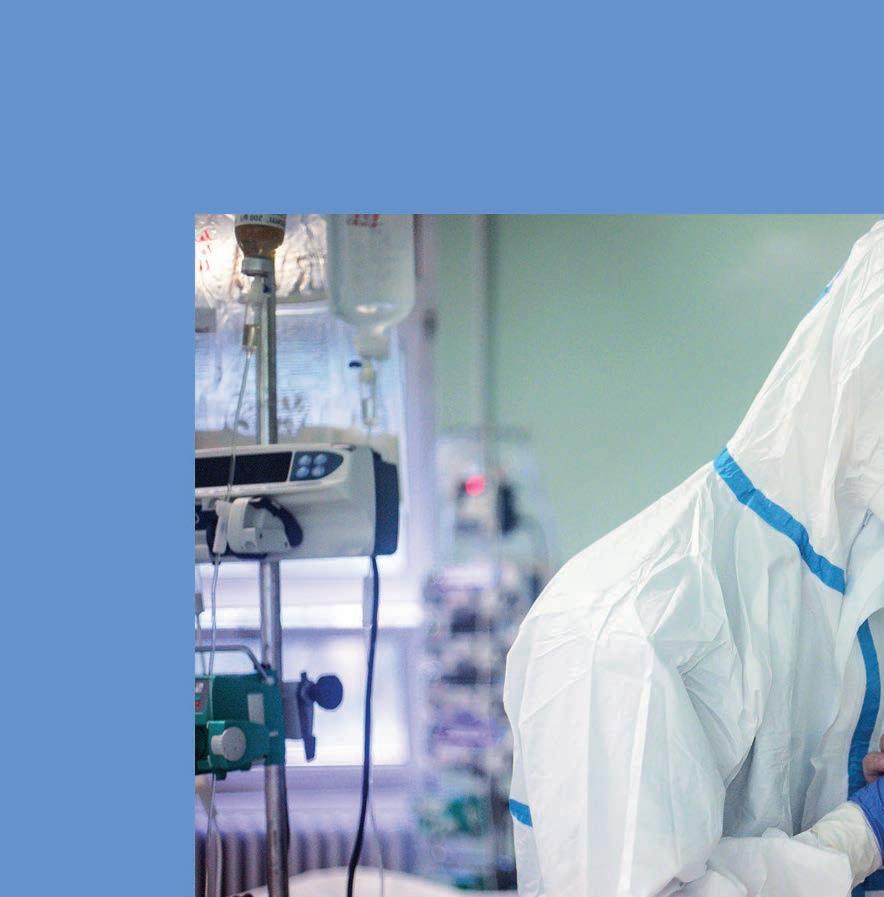

The first national hunting exhibition was held in Hungary in 1871 and was primarily a specialist forum for hunters.




To mark the 100th anniversary of that event, the World Hunting Expo was held in Budapest in 1971. Now, another 50 years later, the World of Hunting and Nature Exhibition takes place in the Hungarian capital. According to the organizers, one of the main attractions will be the Central Hungarian Exhibition, which will show how hunting culture is an integral and exciting part of the country’s 1,000-year history. The Trophy Show is expected to be a major attraction, in which visitors will be able to view the game of the Carpathian Basin and the world in active dioramas as well as other elements providing traditional hunting methods such as bowhunting, falconry, muzzleloader hunting and hunting with dogs and horses. The treasures of Hungarian waters will be presented in areas of water totaling more than 700 square meters, containing 1 million liters of water, with 2,000 individual fish from nearly 50 species. onewithnature2021.org
ZUBIN MEHTA AND THE ORCHESTRA DEL MAGGIO MUSICALE FIORENTINO


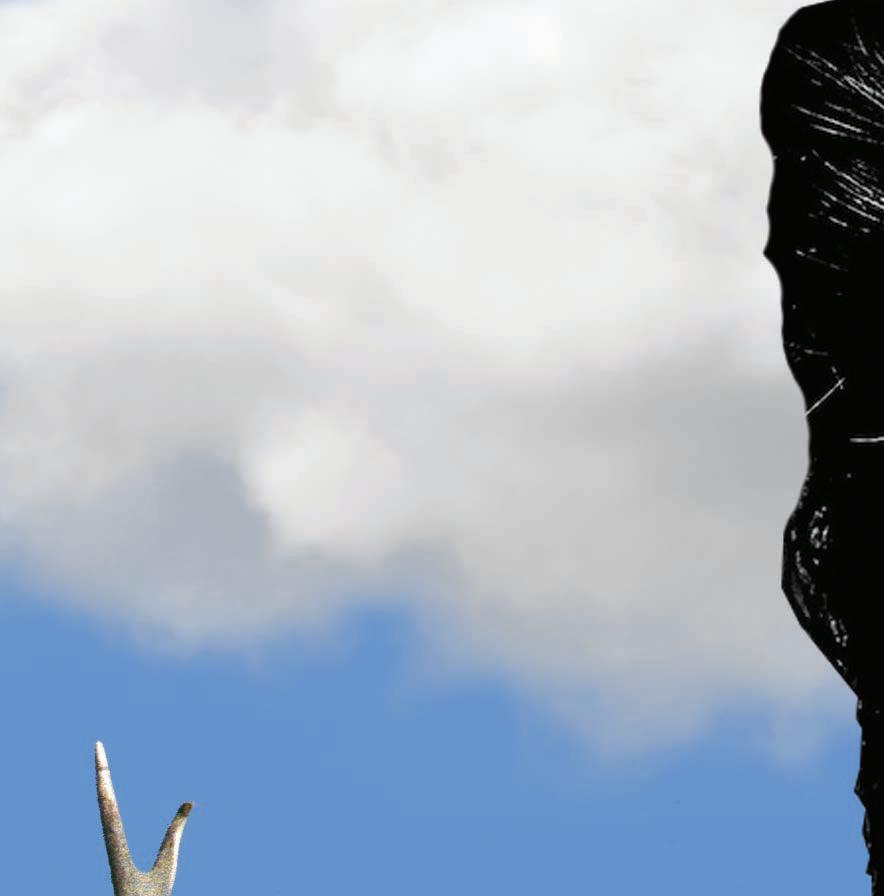
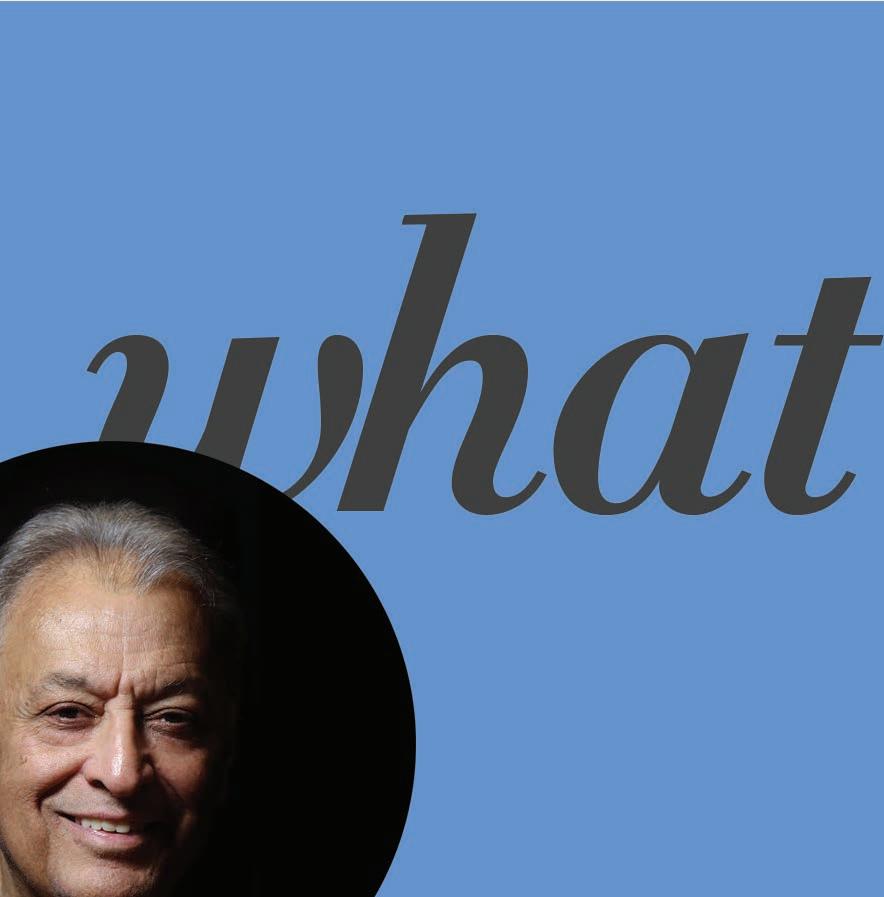
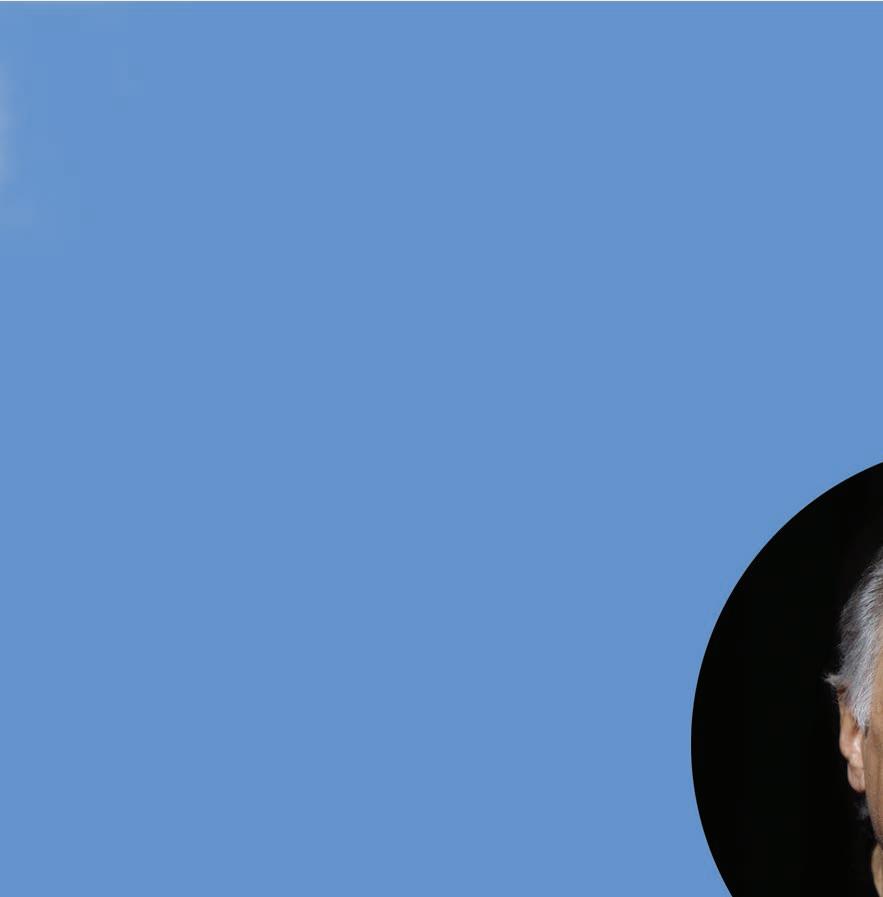
AUGUST 15 PALACE OF ARTS
The Maggio Musicale Fiorentino festival orchestra was established in 1928. Over the course of its nearly a century of existence, the legendary ensemble has collaborated with an amazing series of great conductors, ranging from Wilhelm Furtwängler, Bruno Walter and Otto Klemperer to Seiji Ozawa, Carlos Kleiber and Riccardo Chailly. Zubin Mehta headed the festival between 1985 and 2017, another golden age in the history of work with the orchestra. The Mumbai-born Mehta, who studied at the University of Music and Performing Arts Vienna on his way to becoming one of the greatest conductors of our time, conveys the artistic message of an unforgettable generation. In Budapest, they perform Piano Concerto No. 1 in D minor, Op. 15 by Brahms and Beethoven’s Symphony No. 6 in F major ("Pastoral"), Op. 68.
According to the concert organizers, the audience will enjoy a blissful symphony brimming with a love of nature that presages the style of Romantic expression and a piano concerto, tragic in mood, that consummates it. “Beethoven and Brahms. That is, Brahms and Beethoven, because at this concert we will progress from the result to the antecedent. The soloist is one of the leading pianists of our time, and one who has so far escaped visiting us, yet another reason why it will be worth hearing him at last. One of the doyens of his profession, the conductor served as music director of this storied Italian orchestra for 32 years. Everything we need for a magical night!” mupa.hu
KALEO
JANUARY 27

BARBA
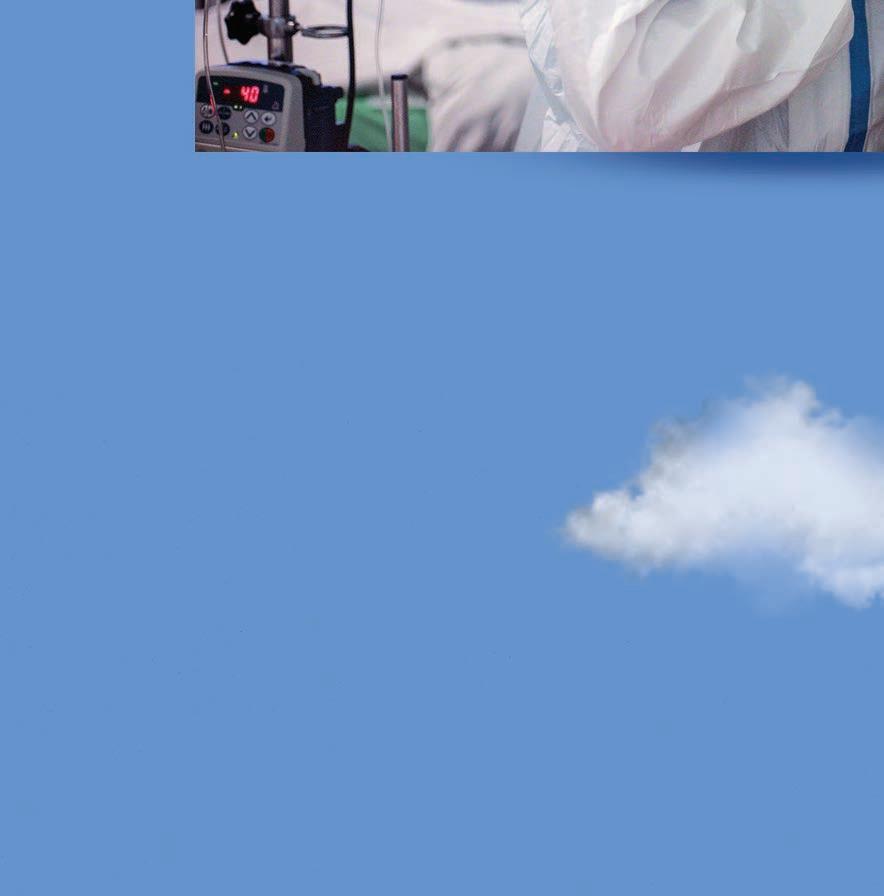
NEGRA MUSIC CLUB
Since the release of their gold-certified breakthrough album, 2016’s A/B, Icelandic rock band KALEO – led by frontman/ songwriter JJ Julius Son – has taken their music around the world. The album spawned three hit singles: the Grammy-nominated ‘No Good’, the gold-selling ‘All The Pretty Girls’, and the chart-topping, two-time Platinum-certified ‘Way Down We Go’, which was used in over two dozen television shows from Grey’s Anatomy to Riverdale, leading the No. 1 single to top The Hollywood Reporter’s Top TV Songs chart. After amassing over a billion global streams, 39 international certifications, and countless soldout headline shows spanning from London to Moscow, KALEO has proven to be a worldwide phenomenon. Known for their electrifying live performances, KALEO completely sold out their first U.S. headline tour and was a standout at Coachella, Lollapalooza and Bonnaroo and recently were handpicked to open stadium dates for the Rolling Stones.
KALEO's sophomore album ‘Surface Sounds’ was released on April 23, 2021 and features lead singles ‘I Want More’, and ‘Break My Baby’ as well as ‘Alter Ego’, ‘Backbone’, ‘Skinny’ and ‘Hey Gringo’. livenation.hu

15
RÓBERT HEGEDŰS (MAGYAR HÍRLAP), DEPOSITPHOTOS.COM, ALBERTO CONTI, DAN WINTERS www.dteurope.com |DIPLOMACY & TRADE| JULY 2021
photo by
HUNGARIAN PRESS PHOTO CONTEST 2021
ACHIEVING THE BODY OF YOUR DREAMS

‘DREAM BODY & MORE’ PROVIDES ALL THE LATEST NON-INVASIVE, PAIN-FREE BODY-CONTOURING TECHNOLOGIES
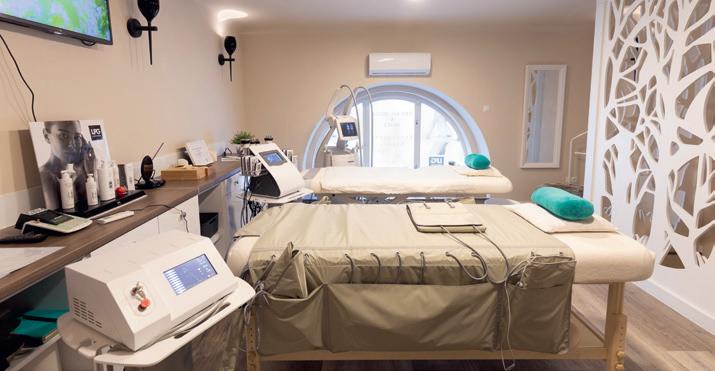
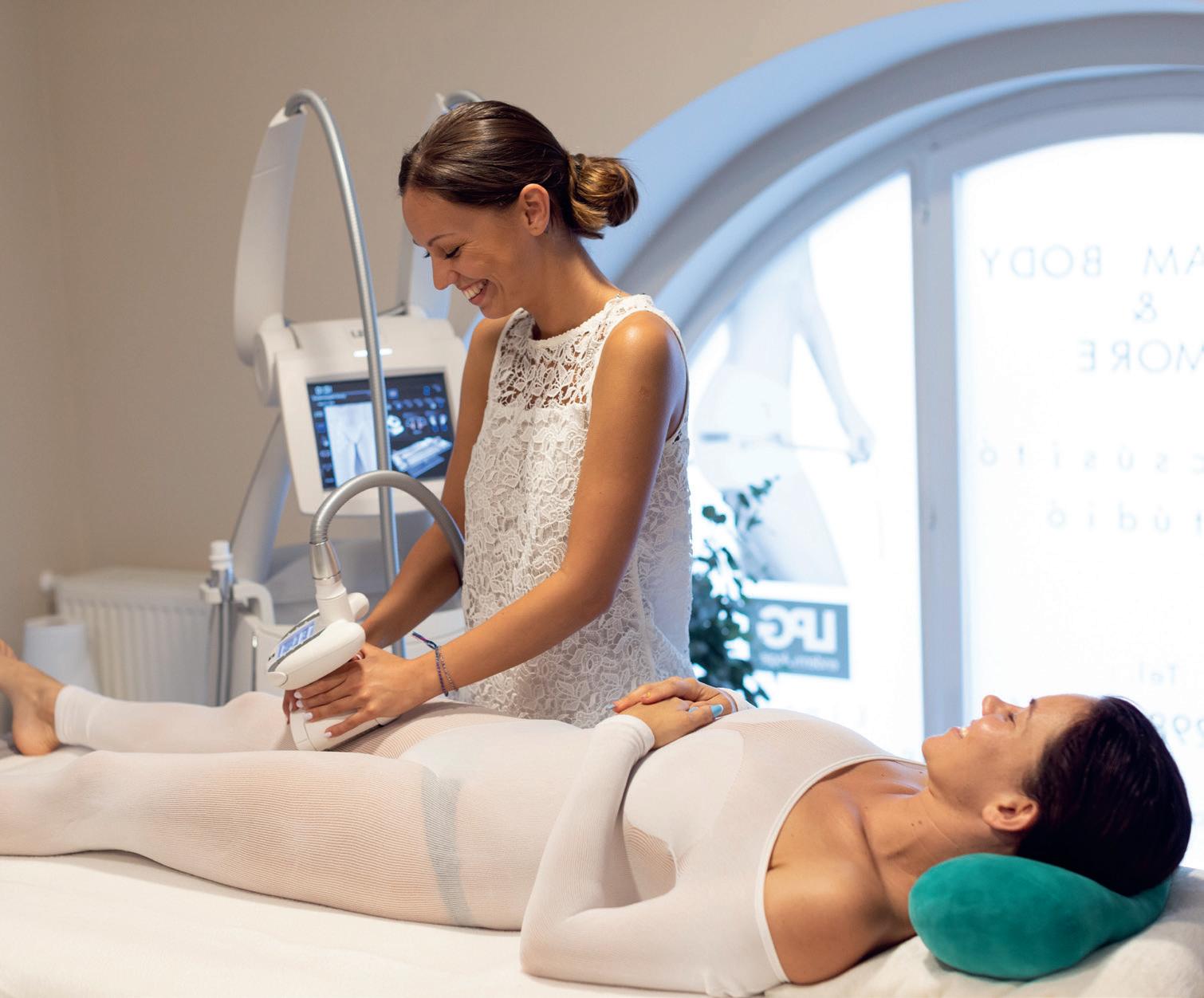








































People who would continuously like to improve their appearance can achieve a lot from exercise to diets. However, they do not always help and that is when new technologies come into the picture. That is what the ‘Dream Body & More’ body slimming studio, located in downtown Budapest with easy access from both the Buda and Pest sides of the capital, can offer to its clients.
Those trying to lose weight and/ or get into better shape often find that exercise and diets, by themselves are not sufficient (like in the case of cellulitis) and therefore, body-contouring technology could be the solution.


The ‘Dream Body & More’ body slimming studio has been created with the aim of integrating innovative technologies into a comprehensive service that will help people to achieve the body of their dreams in the most efficient way. The comprehensive integrated service is not just a term, but a proven method, which – in addition to ultrasound cavitation, radiofrequency, lipo-laser, machine lymphatic massage and muscle stimulation, together with tailor-made nutrition consultation –, will make the process more effective and enjoyable.
All the latest technologies
There are several places that offer different technologies but not in a comprehensive manner that one will find at ‘Dream Body & More’. Providing all the latest non-invasive and pain-free technological methods and combining them in a way that will help clients to achieve their personal goals in improving their skin and their appearance. On top of these treatments, the slimming studio
also offers tailor-made nutrition consulting, counseling and hypnotherapy. The latter one is something special on the Hungarian scene and the studio employs an internationally recognized expert in this field: she can tackle the emotional side of the therapy, for instance, when someone is sad or depressed and ‘escapes’ into overeating. In combination with other methods, the therapy can achieve great results in losing body weight. With its prime downtown location, the ‘Dream Body & More’ slimming studio is also meant for the international community. Consultation with the clients is important in establishing the personal goal of the client, analysis of the skin type and the technology that is best suited for the treatment. (X) www.dreambodyandmore.hu

SERVICES FOR YOUR BODY
LPG treatment (or LipoMassage) stimulates fat cells in the body to help the person lose fat faster, firm and smooth any flabby skin and reduce cellulite. Ultrasound cavitation, is a procedure used to break apart fat deposits in the body. The treatment claims to work as an effective, less invasive alternative to liposuction.

Lipolaser is a non-invasive body contouring system for the reduction of stubborn fat in areas such as the abdomen and love handles.
Radiofrequency (RF) therapy is a nonsurgical method of tightening the skin. The procedure involves using energy waves to heat the deep layer of the skin to stimulate the production of collagen.
Pressotherapy promotes lymphatic drainage by using air pressure on different parts of the body. By alternating between compression and decompression, it effectively stimulates the lymphatic system.
JULY 2021 |DIPLOMACY & TRADE| www.dteurope.com business 16 photo by DÁVID HARANGOZÓ
BE STYLISH AND DIFFERENT: BE YOURSELF!
LADIES ARE ENCOURAGED TO EXPRESS THEMSELVES THROUGH THE WAY THEY DRESS
Having spent two decades working for multinational companies, Anita Kurunczi has decided to accomplish her long cherished dream based on what she had learned from her tailor grandfather: design and sell stylish fashion clothes with an eye to environmental considerations.

She has long been making dresses –even during those ‘multinational years’ – but just for herself and friends. “My grandfather taught me the authentic tailoring skills to make lasting and quality clothing and this
is the tradition that I wish to carry on now,” Anita Kurunczi tells Diplomacy&Trade. She was further encouraged by the words of appreciation she received from people at various events where she appeared in dresses she designed.
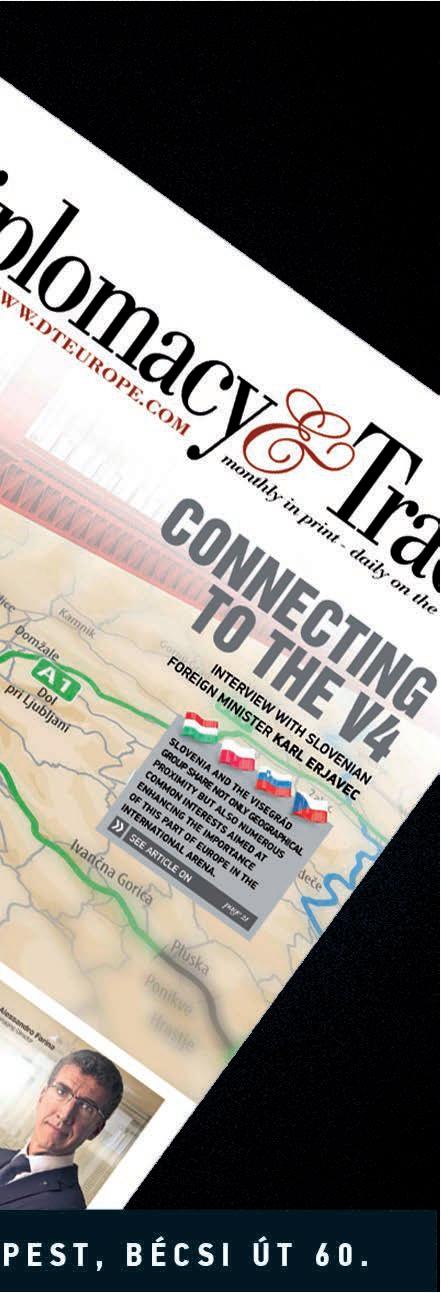
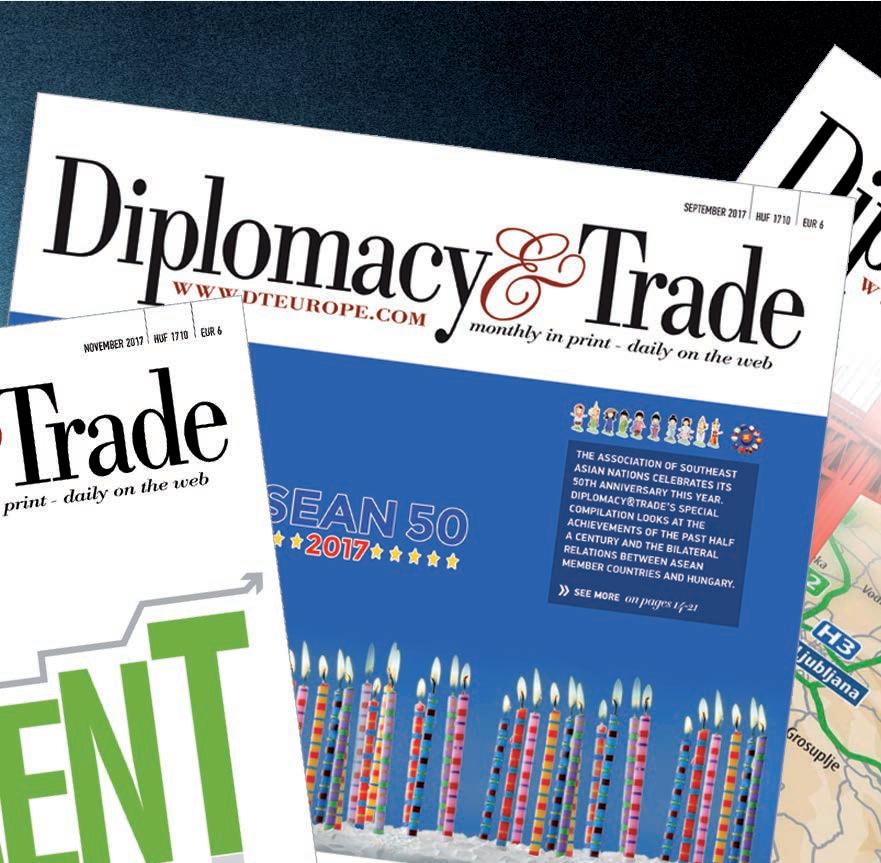
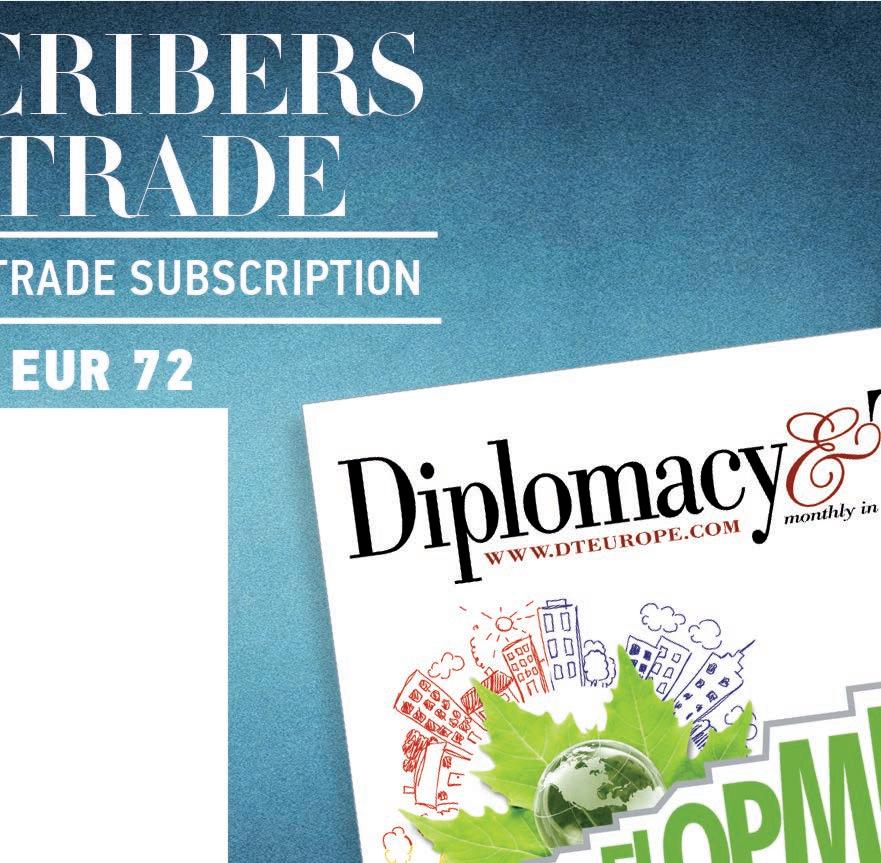
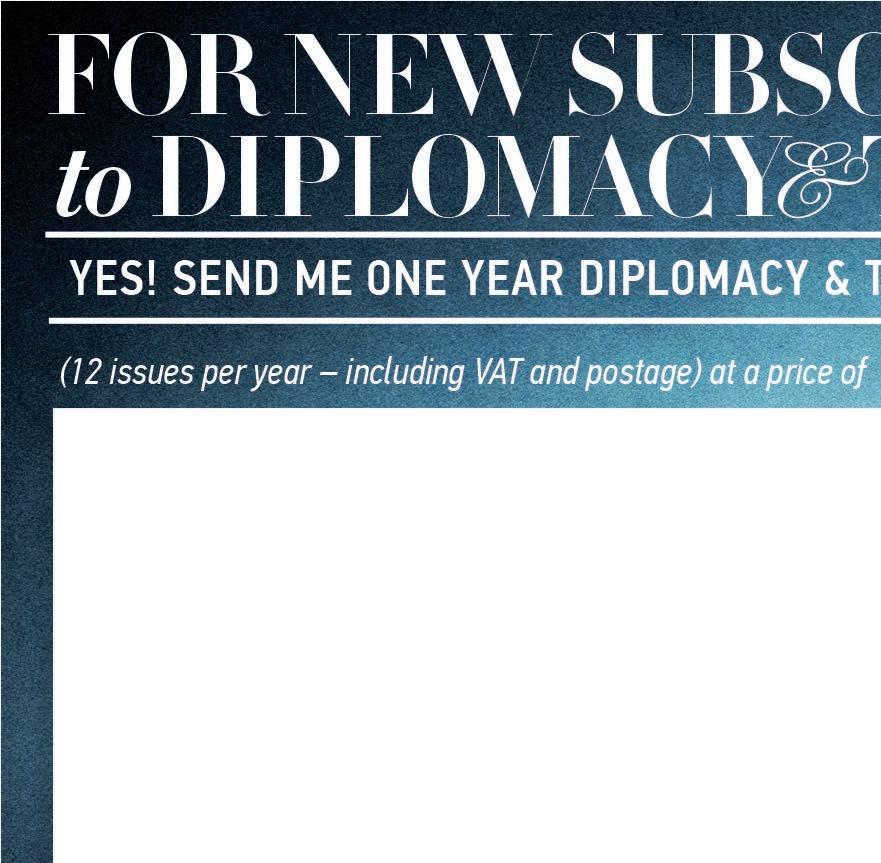
Following the launch of her website and web shop in February 2020, she opened her shop and showroom in downtown Budapest in February this year – soon to be closed due to pandemic restrictions. Now, the shop is open to customers again.
Style – Different – You
She stresses that the three words in the slogan of her business (Style – Different – You) should be interpreted together, in relation to each other. “Be stylish, dare to be different, dare to be You! I like it very much when someone does not follow a trend just because it is said to be fashionable – especially that it does not suit everybody. Everyone is different but they should be themselves, should be of individual style, matching who they are.”
This philosophy behind the slogan is also behind the dresses she makes. “I also draw dresses and have several clients for whom the dresses are individually designed – ‘tailor-made’ in the true sense of this expression. I consult with the client, we talk a bit so that I can get to know her. Then, a few designs are created – designs that are modified together. Of course, by then, I have some ideas: what style would suit her, what type she is, what her figure is like – all this let me design a dress for her.”
For a ‘feel-good’ wardrobe
As for the shop, she says “it may look like a boutique but – in my eyes – it is much more than that. The dresses available here are fitted to the customer most of whom do not fall into the idealistic female shape of 36-38, not to speak of the fact that different women feel different in the same dress! My intention is to create a wardrobe of comfortable, fitting, tailor-made and lasting pieces of clothes.” This individualism is wellreflected in the shopwindow mannequin wearing a crystal mask. “My vision is to have a fashion show where the models’ faces are covered by crystal masks so that their face does not distract attention from the dresses,” she says. In the future, Anita Kurunczi would like to complement this ‘be yourself’ line with a coaching activity. She is of the view that people should also express who they are with their clothes. She understands that it is a difficult story for many people, thus, she would like to start coaching on this theme in small groups. “But that is going to be a different story,” she concludes.
Buyer: VAT Number:
Address:
Name: Phone: E-mail:


PAYMENT BANK TRANSFER
Account No: Unicredit Bank 10918001-00000106-89200006
Please, invoice me at the address:
Date:
Signature:
www.dteurope.com |DIPLOMACY & TRADE| JULY 2021 17 photo by DÁVID HARANGOZÓ
business
DRIVEN BY CURIOSITY
WOLFGANG PUCK OPENS A BUDAPEST ‘RESTAURANT WITH ROOMS UPSTAIRS’
World-renowned Austrian-American chef and restaurateur Wolfgang Puck has recently opened, in Budapest’s Matild Palace hotel, the first European outpost of his iconic Spago restaurant, which stars as his signature culinary experience. He shares some thoughts with Diplomacy&Trade on how his career has evolved and how the experience accumulated is put to use in the Hungarian capital.
are now in the second generation as my son, Byron is working with me. He is really important for the future. My wife is involved in choosing architects, designing and framing the restaurants so everything looks right. This gives us a stronger grasp on projecting to the world who we are.”
Cooking should reflect the people
The original Spago restaurant in Los Angeles is labeled ‘California cuisine’. In order to explain what that means, Wolfgang Puck recalls that when he opened Spago in 1982, he actually designed the menu himself. “I said, cooking should reflect the culture of the people and their surroundings. The culture in Los Angeles is really many different cultures that come together. How many cities are there where you find a Chinatown, Little Tokyo, a Korea town, a little India, the Latin community and everything else? I strongly felt that our cooking should reflect the cultures in the city, should reflect the city itself. So, that's how I decided in 1982 to put raw tuna on the menu and make a pizza but make it different, make it ours. We have to be innovative. We have to make the best quality, and the reason we are lucky in LA is that we have the best ingredients available there. California has a really dry climate so if you go to the farmers’ market, you get the best and freshest produce. And the same thing is true for the fish market. If I buy fish, where do I go? Where all the Japanese chefs go from Little Tokyo. So, we bought the same fish as they did. We cooked some but also served some raw, and I also learned from the Chinese part of the city. Basically, what California meant for me was a reflection, a mirror of the different cultures and people who live in LA.”
A restaurant with rooms upstairs
Answering the question of what he considers himself, Wolfgang Puck says that “I think it is interesting because we always expand our universe in our head. So, who am I? First of all, I'm a father, I'm a husband. Really, those are the most important things so, when I die, if I have a tombstone that says ‘he had a great restaurant’ it wouldn’t mean as much as having the kids say he was a great father and also maybe my wife would say, a good husband.”
Skipping high school, going to Harvard
He adds that in the end, it is curiosity that drives his life. “I love to do things I never did before. Why did I come to Budapest? Because I really don't know it. Instead of going somewhere safe, I always try to go to the frontier and learn something new; first about the people and then about the place. So, when I look at myself, I say who am I? I’m a person who is really curious and who likes to learn. That may sound crazy as I never went to high school, I stopped school when I was 14.” Four years ago, he was interviewed by a journal and was asked what his dream was.
He answered his dream would be to go to Harvard. A week later, the dean of the Harvard Business School called him: ‘Wolfgang, when would you like to come to Harvard?’ The chef says he tried to find excuses like he never went to high school or never went to college but the dean replied: ‘it's okay, we have a program for you: Owner/President Management (OPM) requiring participation three times a month, over a twoyear period’, in which, instead of students, one is in the company of business people. “For me, it was so interesting to hear and see, and also find out, why Harvard is so famous. You know, anybody can build a nice building, but it's really the teachers there, the passion they have that is really amazing. And for me to finish that program and get a degree, and to have my kids come to my graduation, was really exciting. Did I ever think I would do that? No, but I was curious,” he notes.
Driven by passion
Despite the fact that Wolfgang Puck did not finish school, he became successful in the very difficult restaurant business, which requires management skills: suppliers, staff, pricing, costing – so many
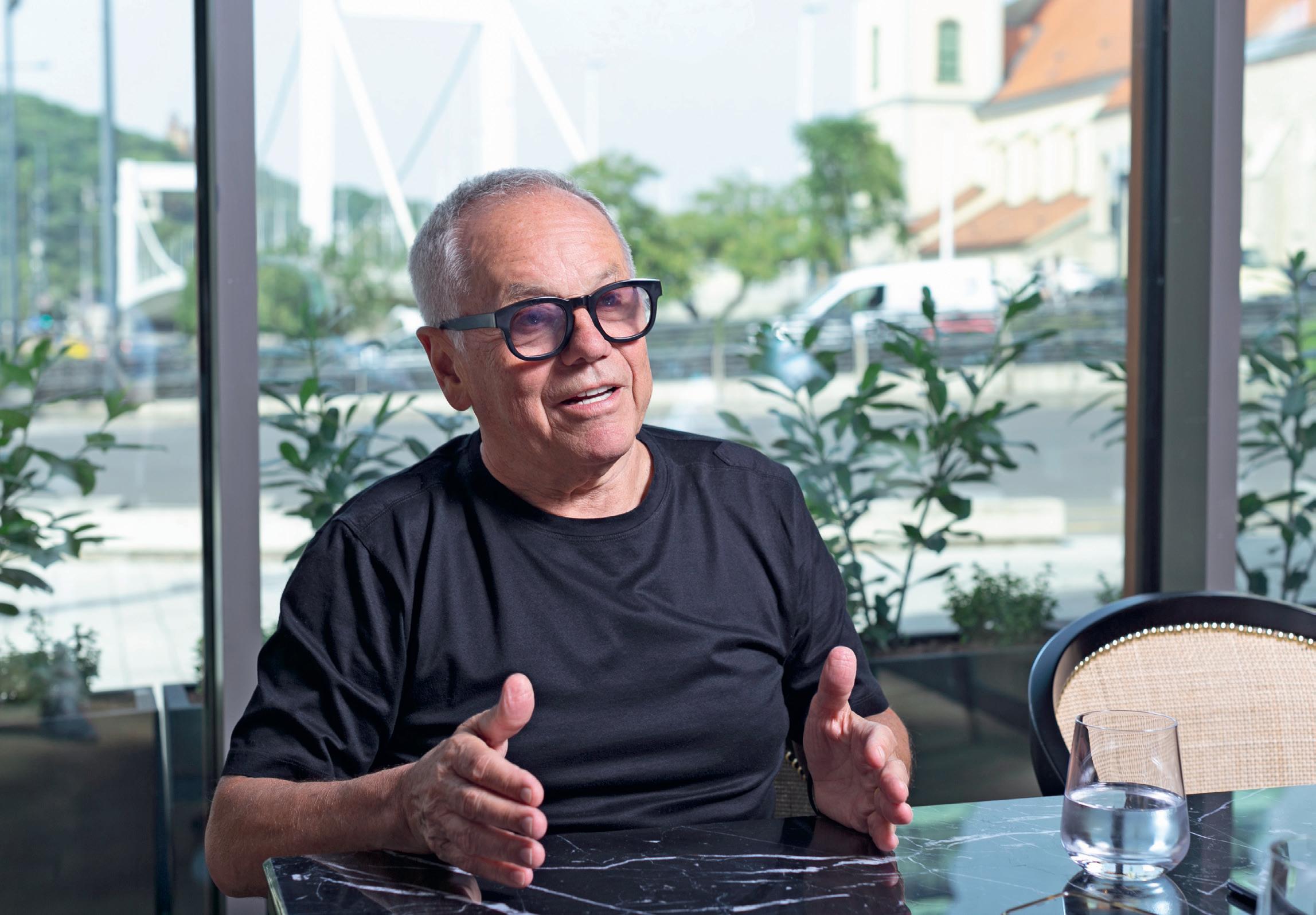
tricks of the trade that one must have eyes on all the time. As the restaurateur highlights, “first of all, if you're driven by passion, if you really love what you do, somehow you make it work. You don't have to go to Harvard Business School to learn how to run a restaurant. We are in the hospitality business, so the first thing we must do is make our guests feel good.” His mother told him when he was 14 and he left his home: ‘Just remember: you have to make more money than you spend. So that you don't come back home and ask for money…’
An empire of restaurants
Certainly, Wolfgang Puck took her mother’s advice and learned how ‘to make more money’; today having 40 restaurants, an empire spread throughout the world. One would think the control of this empire must be very difficult, but the chef points out that building out this network took place over a 40-year period. “It wasn't like we started five years ago and now we have 40 restaurants. Over a long time, we developed a great team and giving young people opportunities is really an important part of the process. We
When asked how his business philosophy translates to Budapest, the restaurateur stresses that “we need to show who we are. “We're not going to make something Hungarian because that is already here. Instead, we are going to add a few scents, which are Hungarian. I'm sure the local Hungarians who will come to Spago have their favorite restaurant where are they get goulash soup so, I don't think we have to do that. We have our brand and need to show who we are.” The other thing he points out is that if he is traveling, he does not want to eat at a hotel restaurant. “People want to go to independent restaurants, so we always say in this case of the Matild Palace that ‘we have a restaurant with rooms upstairs’. In a way, because of the pandemic, we are lucky because we meet so many local people rather than tourists nowadays. Some of our managers get to know them and some of them have come to our restaurant three, four times already in two weeks. And, I think that will be beneficial for us in the long run, they tell their friends and they come back with new friends. I think, as always, we have to be interested in the local community, to get them interested in us,” Wolfgang Puck concludes.
JULY 2021 |DIPLOMACY & TRADE| www.dteurope.com hospitality 18 photo by DÁVID HARANGOZÓ
WINES FROM THE SHORES OF LAKE FERTŐ
OUTSTANDING VINTAGES FROM THE 35-YEAR-OLD VINCELLÉR WINERY



The Sopron wine-growing region is undoubtedly unique due to the special climate of Lake Fertő and the mica schist-rich soil in many plots. This wine region being typically cooler in character, could be a great winner of climate change, where several varieties could be in the spotlight beyond Kékfrankos (Blaufränkisch).
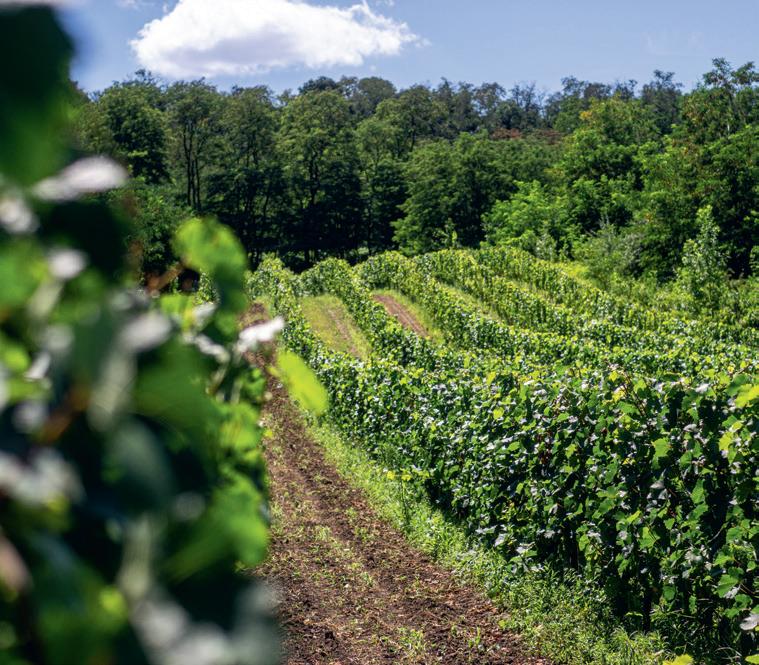
wine
The story of the Vincellér Winery began in 1986, when five families, as the leading viticulturists of the local state cooperative, joined forces to start their own business. The winery in Fertőboz, in the cellars of the former Széchenyi Mansion, has developed nicely and in 2010 it was time for a generation change. Since then, Titi Molnár, one of the founding family members being returned home after his ‘master years’ spent in Austria, has been supervising the viticulture and wine-making activities.
Local varieties
The winery works with a so-called classic variety selection being characteristic of Sopron, with a focus on Carpathian Basin varieties. The white varieties are Zöld Veltelini (Grüner Veltliner) and Zenit, while the black grapes are Kékfrankos and Zweigelt. The latter one is particularly close to Titi Molnár's heart. “It was actually my father who made it possible to grow Zweigelt in Hungary today. In the early 1960s, he spent an apprenticeship in Krems, Austria, in the winery of Lenz Moser on a state scholarship. At the time it was such a big opportunity for a vine grower in a socialist country as if I were the first person to plant Zweigelt on the Moon. There were several successful moments of this Austrian internship, one of the most important was that he noticed this Austrian variety there and then brought the first vines into the country to create the first plantation.”
Telling labels
A primary concern for the winery is to cultivate the grapes in a sustainable and gentle manner, in harmony with their environment. Wine labels also highlight this philosophy by depicting the typical wildlife of the Fertő region. Elderberries adorn the bottle of the Zöld Veltelini as the 700-year-old village, Fertőboz is named after this plant; the high-quality reeds defining the lakeside are on the Zenit, and the barn swallow naturally providing mosquito control is shown on the label of the Kékfrankos. Furthermore, label of the Vincellér Zweigelt illustrates the grey cattle, a typical livestock of the pastures along the Fertő, while the Rosé wine of the winery features a local frog population of international importance.
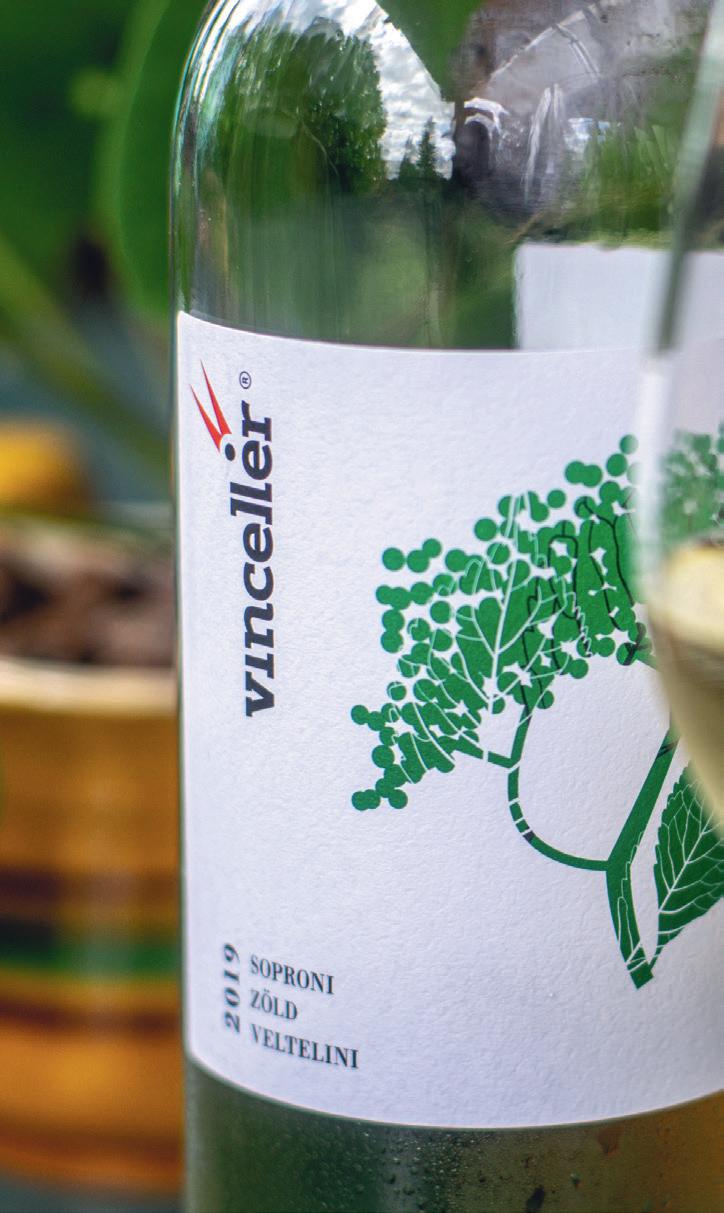
Outstanding vintages
The winemaker's own ambitions are fulfilled in the wines merchandised under the label ‘Molnár Titi Selection’. These wines are made only in outstanding vintages, and are available in very limited quantities in numbered bottles. Specialities such as the orange wine made from Zenit, the Zweigelt harvested from the old vines in the priority areas and the barrel-aged Rosé, which is highly appreciated also by the world's most renowned rosé experts.
”Our cellar in Fertőboz is located next to the cycle path around the lake, an ideal resting place, from spring to autumn we have a lot of visitors for refreshments and for a fröccs (spritzer). We also like organising special, personalised tastings, and one of our popular programmes is pairing the wines with matching Harrer chocolates. The Sopron wine region has many surprises in store, so it's worth taking a few days to get to know it better!” Titi Molnár recommends.
www.dteurope.com |DIPLOMACY & TRADE| JULY 2021 19 photo by VINCELLÉR WINERY, MÁRTON SZITA
WE ARE WORKING FOR A SUSTAINABLE FUTURE
SPAR takes on an active and pioneering role in matters affecting the future of our planet. In the autumn of 2019, we organized these activities into a unified system, connecting the branches of sustainable development that are important to us, such as environmental protection, support for a healthy lifestyle, food safety, employee support and social responsibility.
www.sparafenntarthatojovoert.hu
JANUARY 2015 |DIPLOMACY & TRADE| www.dteurope.com c c. 18



















































































































































































